

Saudi tourism official clarifies country’s stand on alcohol consumption
- Saudi Arabia
Princess Haifa Mohammed Al-Saud, the kingdom’s assistant minister of tourism, spoke on the subject at the World Economic Forum in Davos
Princess Haifa Mohammed Al-Saud, assistant minister of tourism for Saudi Arabia, has clarified the kingdom’s stance when it comes to the consumption of alcohol.
“The short answer is that we are going to continue with our current laws,” said Princess Haifa, while speaking at a panel discussion at the World Economic Forum (WEF) in Davos this week.
“Saudi Arabia has been very transparent on where it stands with everything. We were very clear.” The possession and consumption of alcohol is currently banned within the kingdom.
“We have been doing very well and we have been competing. We have actually been outperforming globally when it comes to tourism with what we have to offer today,” added Princess Haifa.
The remarks were made during a session titled Kingdom of Saudi Arabia: A Future Vision. The panel’s participants, apart from Princess Haifa, included Khalid bin Abdulaziz Al-Falih, Saudi’s Minister of Investment; Minister of Finance, Mohammed bin Abdullah Al-Jadaan; Minister of Communications and Information Technology, Abdullah bin Amer Al-Sawaha; Faisal bin Fadel Al-Ibrahim, the Minister of Economy and Planning.
The clarification came after media reports earlier this month suggested that the topic of alcohol consumption was not completely off the table within one of the kingdom’s prominent giga projects. Saudi moved up 10 places to 33rd in the world overall in the 2021 World Economic Forum Travel and Tourism Development Index released this week at Davos.
The independent index benchmarked 117 countries on 17 pillars fundamental to the development and resilience of their travel and tourism industries. In 2019, Saudi Arabia launched the National Tourism Strategy, a clear plan to drive forward the aims of Vision 2030.
The strategy aims to increase the contribution of the tourism sector to 10 per cent of GDP, create 1 million new jobs, and attract 100 million local and international visits annually by 2030.
You might also like
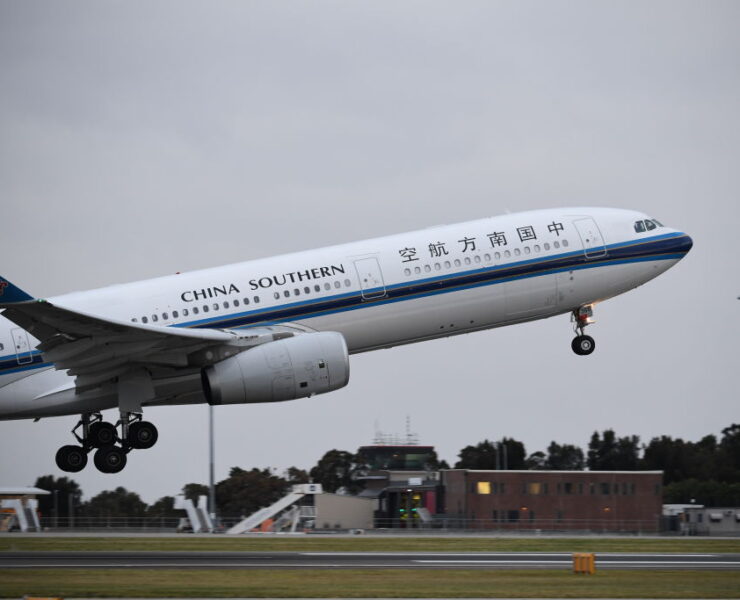
China Southern launches new flights connecting Beijing with Riyadh

‘Unstable weather system’ brings heavy rain to Saudi Arabia, Bahrain
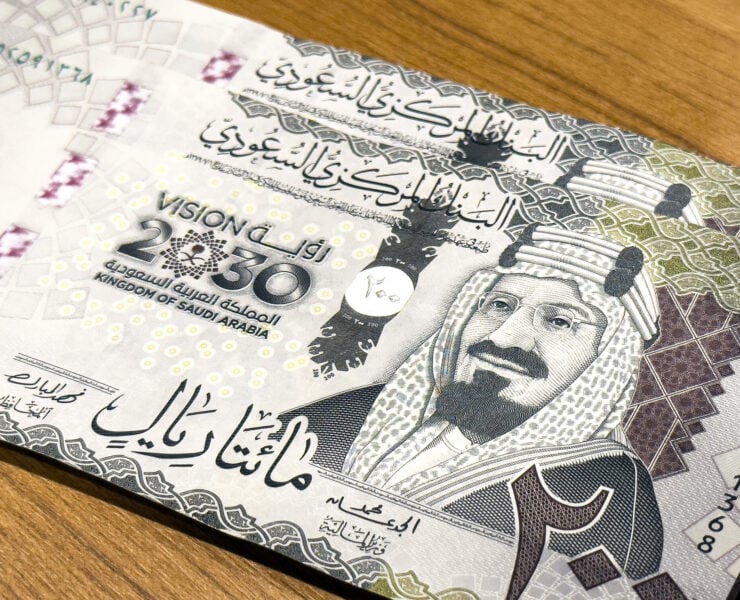
NEOM reportedly considers debut riyal bond sale to fund projects
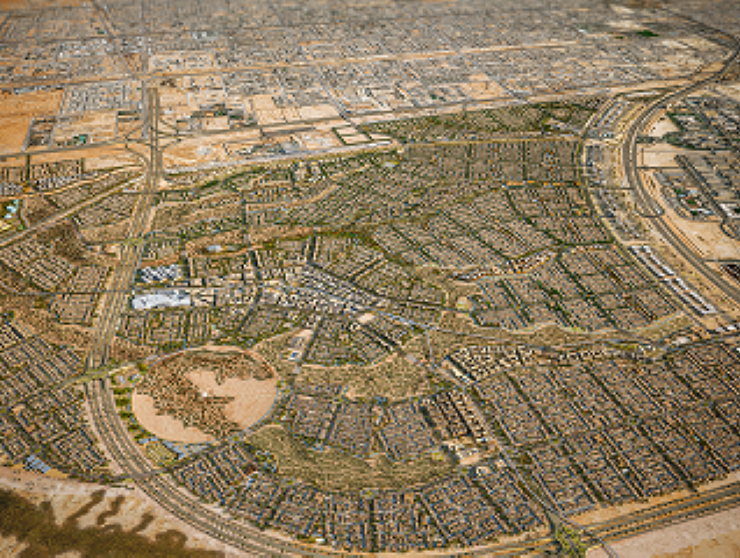
Dar Al Arkan, ROSHN ink deal on SAR215m project in Sedra community
How to claim insurance due to rain damage: understanding ‘force majeure’ clause, dubai airports recovery: here’s what you need to know, want career growth in saudi, uae linkedin says look to these 29 companies, latest issue.
- Real Estate
- Special Report
- Art & Culture
Advertise With Us
Privacy policy.
© 2021 MOTIVATE MEDIA GROUP. ALL RIGHTS RESERVED.
Saudi Arabia is admitting general tourists for the first time. Here are 22 things that could get you arrested or fined, like dabbing, carrying a Bible, or wearing shorts
- Saudi Arabia is finally open for mass tourism after the launch of a new tourist visa on September 27.
- The country is full of wonder, with five pristine UNESCO heritage sights, Red Sea beach resorts, and futuristic cities like Riyadh.
- But the kingdom's laws are complicated, and tourists can easily fall foul of them and receive a hefty fine, or worse.
- Here's what to look out for.
- Visit Insider's homepage for more stories.

On September 27, Saudi Arabia launched a brand-new tourist visa that lets tourists explore the country for 90 days.
It's a landmark moment for the kingdom and its stop-start tourist industry, which hopes to process 100 million tourists a year by 2030.
But the legal system in Saudi Arabia is tricky to navigate and full of pitfalls for tourists unfamiliar with life on the Arabian Peninsula or the government's version of Shariah, or Islamic law.
In September, Saudi Arabia rolled out 19 new public-decency laws , some of which, if violated, are punishable with a maximum $1,600 (6,000 riyal) fine or, in severe cases, imprisonment.
Here's what you need to know.
No dabbing.
The viral 2017 dance move was prohibited by the Saudi Interior Ministry's National Commission for Combating Drugs because of its association with drug culture.
It happened after the Saudi TV host and actor Abdallah al-Shahani was filmed dabbing at a music festival in Taif and later arrested.
Dancing at concerts — a new entertainment experience for Saudis in itself — is also prohibited.
In October 2019, a woman was charged with violating publish morality after a viral video showed her "shuffling" in her abaya and niqab at a concert in Riyadh.
Source: راصد المشاهير , al-Weeam
No wearing shorts.
In September's new public-decency laws, men were advised not to wear shorts and to "dress modestly."
The US State Department advises male visitors to dress conservatively when visiting Saudi Arabia and not go without a shirt.
While the country is moving toward more a relaxed dress code, recently saying female travelers won't have to wear a long cloak called an abaya, it's best to err on the side of caution.
Women are still required to cover their shoulders and knees in public, the public-decency decree states.
Source: The National , Arab News
Getting drunk on the flight over, or bringing in alcohol, could land you in serious trouble.
Alcohol of any kind is banned in Saudi Arabia. Those who break the law are subject to hundreds of lashes, deportation, fines, or imprisonment.
You may be able to access alcohol on the flight over, but if you are deemed to be intoxicated at customs, you risk arrest.
Don't bring in a drone without approval.
Importing drones for commercial or personal use is prohibited without approval from the Saudi General Authority of Civil Aviation.
So, if you're a photographer hoping to get aerial shots, best call ahead.
Source: US State Department
Don't cut in line.
The new public-decency laws say a fine of 50 riyals, or $14, will be incurred by anyone who jumps in front of someone in a queue.
Source: Arab News
You can't bring any pork into the country.
Islam prohibits consumption of pork, and as the birthplace of the religion, Saudi Arabia adheres to this principle with gusto.
This includes pork-flavored chips and snacks.
Strangely, it's forbidden to bring products containing frog meat into the kingdom too.
Gambling is in principle illegal.
While many Saudis play poker and gamble online using VPNs, the punishment for gambling can be as harsh as a six-month jail term.
Source: Blue Abaya
Being gay or transgender is illegal.
In March 2017, two transgender people were shoved in bags, beaten with sticks, and tortured to death, according to human-rights activists with the Blue Veins group.
Sex-reassignment surgery is illegal in Saudi Arabia.
Source: UK government , The Independent
Playing loud music in public is taboo and a finable offense.
It's especially important to observe this rule during each of the 20-minute prayer times, which happen five times a day.
The fine for playing loud music is 500 riyals, or $133, outside prayer time and 1,000 riyals during prayers.
No public displays of affection.
The new public-decency code explicitly warns against public displays of affection, so be wary where your hands are.
The maximum fine for PDA is 3,000 riyals, or $800.
Lighting a barbecue or smoking a Shisha pipe in public areas.
The Ministry of Municipal Affairs announced in November that those lightig barbecues or shisha pipes in public would be slapped with a minimum fine of 100 Riyals ($27.)
Spitting in the street.
Spitting in the street is punishable with a 500 Saudi riyal ($133) fine, according to a new law from the Ministry of Municipal and Rural Affairs.
Any narcotics are illegal in Saudi Arabia, and many drug offenses are punishable by death.
Bringing a Bible into the country, or having any non-Islamic religious items on your person, can land you in trouble.
The government has hinted that personal Bibles can be brought into the country for private worship.
But waving one around in public may see the religious police report you to authorities.
Photographing a Saudi without his or her explicit permission is illegal.
The fine for taking someone's photo without permission is 1,000 riyals, or $266.
Taking up seats and utilities reserved for elderly and disabled people is a finable offense.
The fine for sitting in a priority seat is a 200 riyals, or $53.
Photographing government buildings is illegal, for national security reasons.
It's illegal to subject women and children to pranks or anything that "can scare them or put them in danger."
The advisory was included in the new set of public-decency laws in September.
It's illegal to hold two passports in Saudi Arabia.
Second passports will be confiscated by the immigration authorities if they're discovered.
Source: UK government
Be careful with outward Valentine's Day displays
Valentine's Day, a Christian occasion, has never really been permitted in Saudi Arabia, and it was formally banned in 2008.
Though, last year the ban looked to have eased, with small red tokens appearing freely across the cities of Riyadh and Jeddah and no public injunctions against Valentine's Day items reported.
Source: Business Insider
Sitting as a single man in the family area of a restaurant is also forbidden.
In a famous September 2018 case, an Egyptian man was arrested in Saudi Arabia for having breakfast with an unmarried woman in the family section of a restaurant and posting a video of it to social media.
Some restaurants have relaxed the divide between unmarried and married, but it would be prudent to establish the restaurant's preference before you sit down.
Source: BBC , Reuters
Entering Mecca and Medinah as a non-Muslim is forbidden
Entering either Mecca or Medinah, the two holiest cities in Islam, as a non-Muslim is forbidden, so don't try to sneak in.
The punishment is a large fine, deportation, or whatever the judge decides.
Follow INSIDER on Facebook .
- Main content
- Latest News
- Emergencies
- Ask the Law
- GN Fun Drive
- Visa+Immigration
- Phone+Internet
- Reader Queries
- Safety+Security
- Banking & Insurance
- Dubai Airshow
- Corporate Tax
- Top Destinations
- Corporate News
- Electronics
- Home and Kitchen
- Consumables
- Saving and Investment
- Budget Living
- Expert Columns
- Community Tips
- Cryptocurrency
- Cooking and Cuisines
- Guide to Cooking
- Art & People
- Friday Partner
- Daily Crossword
- Word Search
- Philippines
- Australia-New Zealand
- Corrections
- From the Editors
- Special Reports
- Pregnancy & Baby
- Learning & Play
- Child Health
- For Mums & Dads
- UAE Success Stories
- Live the Luxury
- Culture and History
- Staying Connected
- Entertainment
- Live Scores
- Point Table
- Top Scorers
- Photos & Videos
- Course Reviews
- Learn to Play
- South Indian
- Arab Celebs
- Health+Fitness
- Gitex Global 2023
- Best Of Bollywood
- Special Features
- Investing in the Future
- Know Plan Go
- Gratuity Calculator
- Notifications
- Prayer Times
Saudi Arabia rules out lifting alcohol ban to promote tourism
Saudi tourism is doing well at global level, minister says

Cairo: Saudi Arabia does not plan to lift a ban on serving alcohol as it is opening up to the world and seeking to promote its tourism industry, according to a Saudi official.
Saudi Assistant Minister of Tourism Princess Haifa Bint Mohammad said the kingdom, the birthplace of Islam, would not move to change laws banning alcohol, pointing out that with the restriction, Saudi Arabia has attracted tourists from around the world.
“Saudi Arabia has been very transparent on where it stands on everything, we were very clear,” the official said at the World Economic Forum in Davos, Switzerland.
“The short answer is that we’re going to continue with our current laws.” Princess Haifa was answering a question at a panel session on reports that serving alcohol could be allowed at NEOM, a Saudi futuristic mega-project, according to Okaz newspaper.
“We have been out outperforming globally in tourism with what we currently have to offer today,” Princess Haifa.
“There’s a lot to go around without introducing anything new,” she added.
“The prioritisation of the travel and tourism industry from the government perspective is why we managed to do so well during the pandemic and recover,” Princess Haifa said at the panel titled Saudi Arabia Outlook.
Saudi Arabia has made a 10-mark jump from pre-pandemic levels in the latest edition of the WEF Travel and Tourism Development Index published earlier this week.
The kingdom ranked 34 among more than 100 countries for development, sustainability and resiliency in industry.
In 2019, Saudi Arabia launched a new visa scheme aimed at attracting foreign holidaymakers to the kingdom as part of a plan to diversify its oil-reliant economy.
The instant tourist visa is obtained online or upon arrival at the Saudi airports.
The system is part of the Vision 2030, an ambitious Saudi plan aimed at diversifying the country’s economy.
Saudi Arabia’s pre-coronavirus aim was to attract 100 million visitors annually by 2030.
More From Saudi

Saudi Arabia marks 6th anniversary of cinema reopening

Social media influencers fined for offensive content
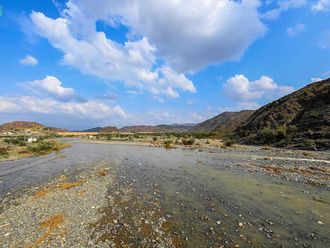
Saudi Arabia braces for heavy rainfall until Tuesday
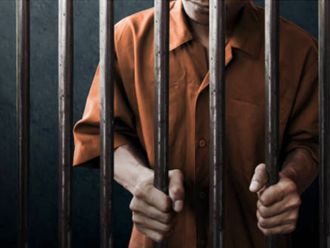
Harassing woman: Expat gets 5 years in jail, hefty fine

Kuwait eases curbs on labour hires from abroad
Kuwait bans 16,000 from travel in two months

Saudi Arabia sets deadline for Umrah pilgrims to depart
Abu dhabi clears accumulated water after heaviest rains, slovenia's umbrella doctor weathers the economic storm, book review: inside forgotten battle of camp bastion, sydney mall attack linked to untreated mental illness, tesla cuts china, us prices as sales dampen.

Get Breaking News Alerts From Gulf News
We’ll send you latest news updates through the day. You can manage them any time by clicking on the notification icon.
- Environment
- Road to Net Zero
- Art & Design
- Film & TV
- Music & On-stage
- Pop Culture
- Fashion & Beauty
- Home & Garden
- Things to do
- Combat Sports
- Horse Racing
- Beyond the Headlines
- Trending Middle East
- Business Extra
- Culture Bites
- Year of Elections
- Pocketful of Dirhams
- Books of My Life
- Iraq: 20 Years On
Saudi Arabia not planning to legalise alcohol for tourists or at Neom, princess says
Tourism minister says the kingdom is 'doing well' in attracting visitors and current laws would remain, saudi arabia doesn't need to legalise alcohol for tourists, princess says.
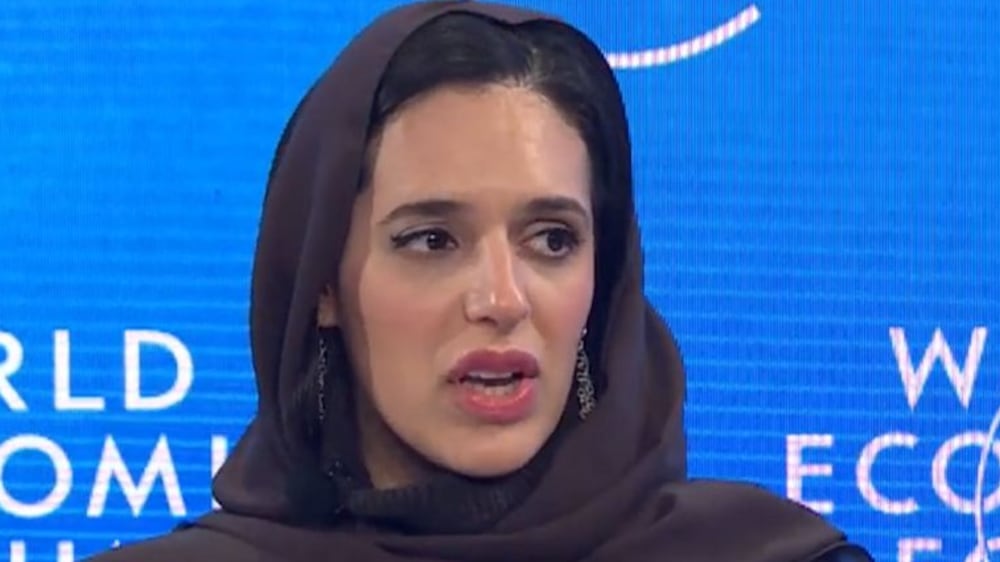
Saudi Arabia has no plans to legalise alcohol — either at futuristic megacity Neom or in a bid to draw more visitors, assistant minister of tourism Princess Haifa bint Mohammed said on Wednesday.
Speaking at the World Economic Forum in Davos, Switzerland, Princess Haifa said the kingdom has been “doing well” in attracting visitors since launching tourism e-visas in 2019 and that rules would remain “the same”.
“The short answer is that we’re going to continue with our current laws,” Princess Haifa said.
Possession, consumption or manufacture of alcohol is illegal in the kingdom.

Trojena will open in 2026 as part of Saudi Arabia's megacity of the future. Photo: Neom
“Saudi Arabia has been very transparent on where it stands on everything, we were very clear and we even heard it from our head of state on where we stand on serving alcohol”.
She insisted that the ban on alcohol had not affected tourism.
“We have been out outperforming globally in tourism with what we currently have to offer today.”
Saudi Arabia rose 10 places in the WEF’s 2021 Travel and Tourism Development Index, which measures sustainable and resilient development of the sector, and was released this week at the Davos summit.
The kingdom was placed second in the Middle East, behind the UAE.
Saudi Arabia opened up to holidaymakers in September 2019, with the launch of the tourist e-visit visa.
This proved popular, with more than 400,000 visas issued within the first 6 months.
“There’s a lot to go around without introducing anything new,” Princess Haifa said.
Earlier this month, Andrew McEvoy, head of the tourism sector at Neom, told The National that “alcohol is definitely not off the table” for the city.
“We need to be competitive, and to do that, we have to match what competing destinations are offering,” he said.
But while the Saudi government had not made any specific comment previously about the sale of alcohol, state media cited official sources denying Mr McEvoy’s claim.
They insisted that while there will be a slightly different legal framework for Neom as a special economic zone, the city will still be governed by the rules and regulations of the kingdom.
Asked in a recent interview about easing alcohol rules, Crown Prince Mohammed bin Salman declined to comment.
Saudi Arabia launches tourism masterplan for historic Al Ula
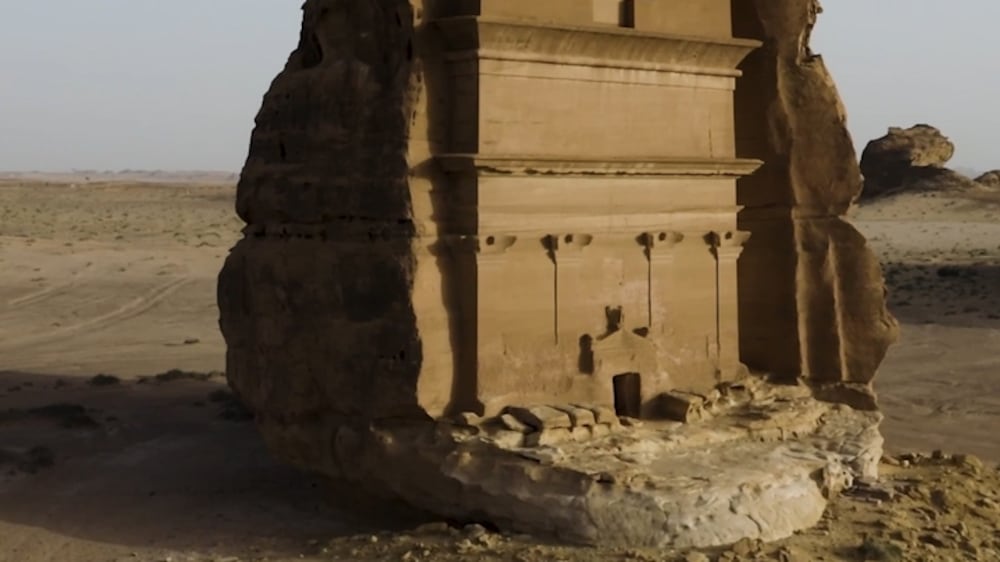
Middle East Today
The must read newsletter for the region


Headscarves, PDA, and alcohol: What to know about visiting Saudi Arabia
Editor’s Note: This CNN Travel series is, or was, sponsored by the country it highlights. CNN retains full editorial control over subject matter, reporting and frequency of the articles and videos within the sponsorship, in compliance with our policy .
Saudi Arabia has set an ambitious goal for itself: 150 million tourist visits by 2030. Travel e-visas, a growing number of international air links and a new 96-hour layover program have all made it logistically easier to visit.
However, for many first-time visitors, especially ones who aren’t familiar with the Middle East or Muslim-majority countries, it’s critical to do some research before setting off.
The first and most basic thing to know about Saudi Arabia is that it’s not closed off from the world. Although the country has only been offering tourist visas since 2019, things have moved pretty quickly since then.
Just like major cities in Europe or North America, Jeddah and Riyadh have hipster cafes, cool arts and culture venues, and major sports teams packed with international players.
Road signs, menus, maps and more are usually in both Arabic and English. Western credit cards are widely accepted, too.
How do I get there?
Saudi Arabia’s primary air hubs are its two biggest cities – capital Riyadh and port city Jeddah. Regular connections are available via Doha, Dubai, London, and other major gateways.
Once you’re traveling within the country, there are several options. Internal flights are easiest for popular tourist destinations like the oasis town of AlUla, which is where travelers go to access the archeological site of Hegra.
Saudi Arabia has also invested heavily in infrastructure, which includes high-speed rail . Right now, the system only serves Jeddah and the surrounding areas, namely the Muslim holy cities of Mecca and Medina, but there are plans to expand.
Foreign visitors can rent cars in Saudi Arabia, and both men and women can drive – provided their international driver’s licenses and other paperwork are in order.
Uber is available in larger cities, as are Middle East rideshare apps like Careem and Kaiian, both of which have English options. For street hails, there are taxi stands at busy areas like shopping malls and sports stadiums. Your hotel can also organize taxis for you.
What should I pack?
Bulgaria-born Elena Nikolova, who converted to Islam and now resides in Jeddah, makes a perfect bridge between locals and outsiders. On her website Muslim Travel Girl , she helps her followers know what to expect when they visit.
Nikolova also adds that while many women wear abayas, loose garments covering the body, or niqabs, which also cover the face, they’re not required for foreigners. “In big cities like Jeddah and Riyadh you don’t need to wear a scarf or abaya. Wearing clothes that cover your body is OK.”
However, she points out that location is important, as smaller villages in more rural areas might not have the same vibe as major cities. “It is better for you to wear a maxi dress for example or an open abaya and scarf [there],” she adds. According to Nikolova, these guidelines are not laws – it’s just about “fitting in.”
Kareem George, CEO of travel specialist and tour organizer Culture Traveler , also fielded clothing-related questions from his clients ahead of a Saudi Arabia tour.
“I was surprised by the variety of dress I observed,” he says. “Saudi women and men both in traditional dress as well as more contemporary attire. There was an overall modesty to the dress for both sexes, however there was a lot of variety in colors, styles and textures.”
That said, it’s not unusual to see some men wearing shorts (granted, knee-length ones like cargos, not short shorts) and polo shirts, as the rules for male clothing are more relaxed.
“There was not an expectation for a foreigner to wear a thobe,” George adds, referring to the traditional garment many men wear in the Middle East. “My Western dress was accepted and not considered rude in any way.”
When it comes to dressing, weather and terrain are important considerations. If you’re planning to hike or visit the desert attractions in AlUla , for example, you’ll want to take tips from the locals: loose-fitting clothing, lightweight fabrics like linen and natural cotton, and hiking boots. It’s not unusual to see a Saudi woman sporting sneakers with her abaya.
And while it’s okay for non-Muslims to visit mosques – a pretty common occurrence, as many are tourist attractions in their own right – proper dress is a must. Women should cover their hair to be respectful.
If you plan to visit mosques, pack some socks – you’ll be asked to remove your shoes to go inside.
Public displays of affection
Tourism is growing in Saudi Arabia and with it more cultural freedoms, but it’s important to remember that certain public displays of affection should be avoided.
No matter the gender or status of the people in a relationship, locking lips in public could result in some surprised stares.
“There is a general expectation of modesty in one’s deportment and respect of others’ personal space in public,” George says.
Nikolova adds: “You can hold hands, but kissing – especially for a prolonged time – is normally frowned upon, mostly because it makes [locals] uncomfortable. “PDA is reserved for couples in private in many Muslim countries.”
Some regulations around unmarried couples have loosened in recent years.
In 2019, Saudi authorities announced that unmarried foreign couples would be permitted to share hotel rooms.
The country’s national travel authority website indicates that LGBTQ tourists are welcome in Saudi Arabia. It says: “Everyone is welcome to visit Saudi, and we ask that they follow and respect our culture and traditions and laws, as you would when visiting any other country in the world.”
That said, it is important to note that gay sex is prohibited by law, with consequences including fines, jail time or even death. The UK Foreign Office , among others, warns its citizens that “homosexual or extra-marital sexual relations, including adultery, are illegal and can be subject to severe penalties.”
There are other social rules to be mindful of. Generally, unrelated men and women wouldn’t be in a private space together. However, this is one of those areas where you’ll need to look around you and do as the locals are doing.
It might be OK for a foreign woman and a local man to have a business meeting together if they’re somewhere public like a coffee shop or if they just keep the office door open. When it comes to greetings, a polite hello is plenty – not everyone will feel comfortable shaking hands or kissing on the cheek, especially with someone of the opposite gender.
In urban areas like Jeddah, single women often take taxis driven by men – but they are expected to always sit in the back.
“It is actually safe for women to travel in Saudi Arabia,” Nikolova says. “You will find that many women go out alone or with friends without issue, especially in large cities like Jeddah and Riyadh.”
Raising a glass
One of the most discussed topics for foreign tourists in Saudi Arabia is alcohol.
While other nearby majority-Muslim countries like Qatar and the United Arab Emirates do sell alcohol under very specific, limited conditions and have it available in hotels, that’s not the case in Saudi. Alcohol isn’t just unfashionable – it’s illegal, regardless of whether you’re a local or a tourist.
And that ban on alcohol isn’t only in practice once you’re on the ground in Saudi Arabia.
That law applies to Saudia, the country’s national airline, as well. If you’re accustomed to having a glass of wine to help you sleep on a long flight, you might want to consider buying a ticket on a carrier that does serve booze on board.
All in the timing
Mecca, Islam’s holiest city, is here in Saudi Arabia. Muslims are required to make the hajj, or religious pilgrimage to the city’s holiest sites, at least once in their lifetime.
Although it may sound like a bad time to visit Saudi Arabia, Nikolova says that if you’re not Muslim and want to see other parts of the country, hajj could actually be the best time to plan a trip.
While restrictions on tourists are put in place at Jeddah, the rest of Saudi Arabia remains open for tourists, says Nikolova. “Usually that time is also less crowded, as many locals and expats have two weeks off and leave the country for holidays.”
When it comes to visiting mosques, it’s best not to try to go on a Friday, which is the holiest day of the week, or during prayer times. Many mosques will post visitors’ hours outside, and the larger, more famous ones often have a website with more details.
However, there are some mosques you won’t be able to visit – namely those in Mecca and Medina. Those are restricted to Muslims only.
It might also be wise for non-Muslims to avoid visiting during Ramadan, which is the ninth month of the Islamic calendar. (In 2024, it’s likely to run from March 10 to April 8 - lunar months like Ramadan can vary a day either side)
“I would recommend avoiding Muslim countries during Ramadan because there is not much to do during the day,” Nikolova says, noting that because participants fast during the day and eat at night, shops and restaurants open later or not at all.
Many locals also advise against visiting in summer, as it’s normal for temperatures to top 120 degrees Fahrenheit (about 50 Celsius).
Due to the extreme heat, some businesses will close in the afternoon and reopen again later in the day. For example, in Jeddah’s historic al-Balad neighborhood , most cafes and stores shut for several hours at midday.
If you want to find a place that’s open for lunch, head to a mall – and also bring a sweater, as air-conditioning can sometimes overcompensate for the weather by being very strong.
The Red Sea’s luxurious waterfront resorts are best experienced in shoulder season, when prices are lower as well.
January is generally the coolest month of the year, with temperatures around 64-68 Fahrenheit (18-20 degrees Celsius). Winter is the ideal season for enjoying Saudi Arabia’s many outdoor activities, from hiking historic archeological sites to stargazing in the desert.
CNN’s Julia Buckley contributed reporting.
For more CNN news and newsletters create an account at CNN.com
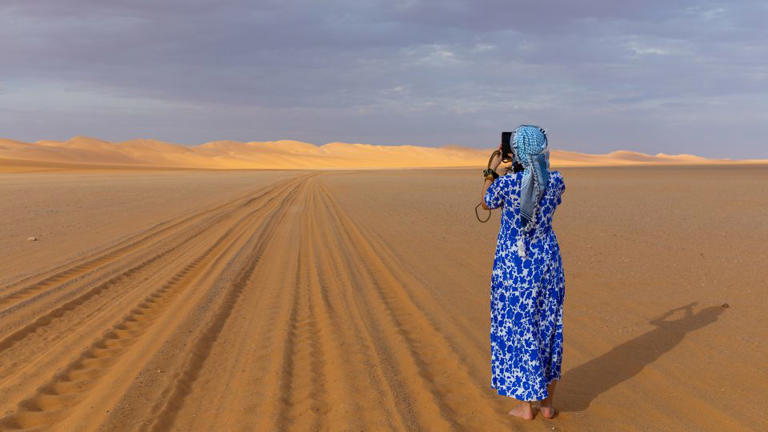
- Work & Careers
- Life & Arts
Become an FT subscriber
Try unlimited access Only $1 for 4 weeks
Then $75 per month. Complete digital access to quality FT journalism on any device. Cancel anytime during your trial.
- Global news & analysis
- Expert opinion
- Special features
- FirstFT newsletter
- Videos & Podcasts
- Android & iOS app
- FT Edit app
- 10 gift articles per month
Explore more offers.
Standard digital.
- FT Digital Edition
Premium Digital
Print + premium digital, weekend print + standard digital, weekend print + premium digital.
Today's FT newspaper for easy reading on any device. This does not include ft.com or FT App access.
- 10 additional gift articles per month
- Global news & analysis
- Exclusive FT analysis
- Videos & Podcasts
- FT App on Android & iOS
- Everything in Standard Digital
- Premium newsletters
- Weekday Print Edition
- FT Weekend Print delivery
- Everything in Premium Digital
Essential digital access to quality FT journalism on any device. Pay a year upfront and save 20%.
- Everything in Print
Complete digital access to quality FT journalism with expert analysis from industry leaders. Pay a year upfront and save 20%.
Terms & Conditions apply
Explore our full range of subscriptions.
Why the ft.
See why over a million readers pay to read the Financial Times.
International Edition

MORPHOTRIPS
Morphotrips
Can tourists drink alcohol in Saudi Arabia?
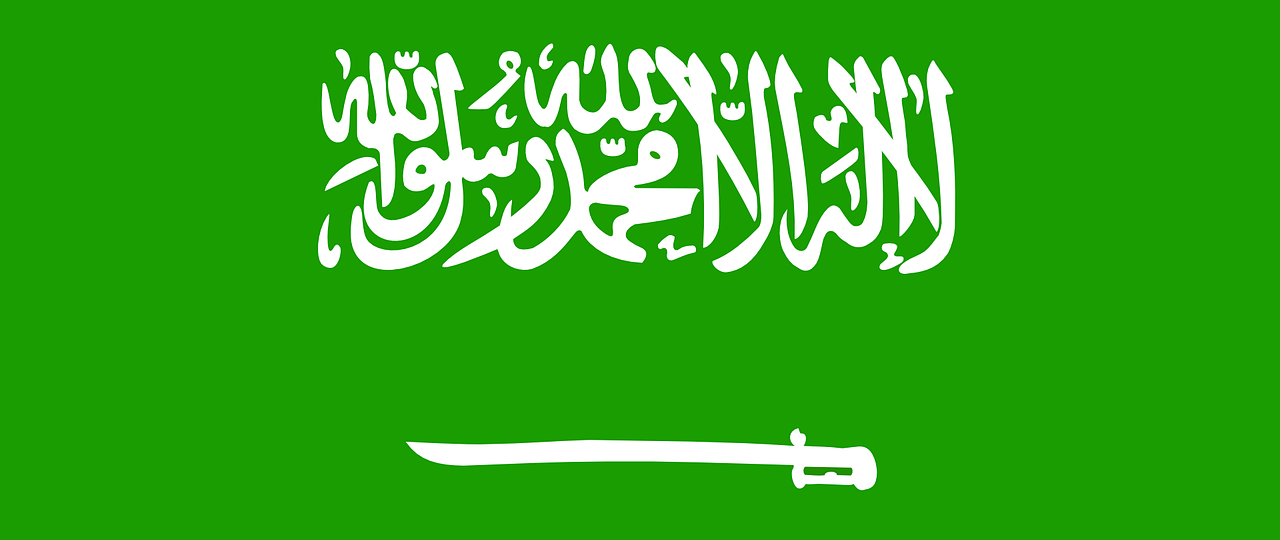
If you’re planning a trip to Saudi Arabia, it’s crucial to be aware of the rules and regulations in this fascinating country. Saudi Arabia is a place steeped in history and culture, but it also has its own social norms and laws. In this article, we’ll inform you about 10 things you can’t do as a tourist in Saudi Arabia. From alcohol consumption to dress code restrictions , we assure you that this knowledge will help you enjoy your trip respectfully and hassle-free.
10 Things Tourists Can’t Do in Saudi Arabia
1. no alcohol consumption:.
One of the strictest rules in Saudi Arabia is the complete prohibition of alcohol . It doesn’t matter how accustomed you are to enjoying a glass of wine with your dinner; in Saudi Arabia, alcohol consumption is illegal for everyone, including tourists. This is because the country adheres to a strict interpretation of Islamic law, which forbids the consumption of alcoholic beverages .
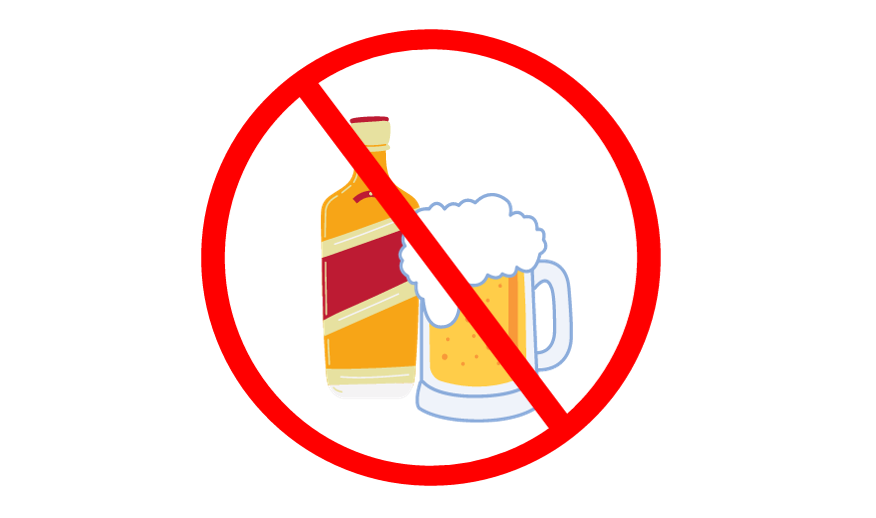
2. Modest Dress Code:
Another important thing to keep in mind is that all visitors are expected to dress modestly and conservatively , when they are walking through the city, without needing to cover their face or hair in case of women. In case of visiting a mosque, women should cover their heads with a hijab and wear clothing that covers their arms and legs. Men should also dress modestly, avoiding sleeveless shirts and shorts.
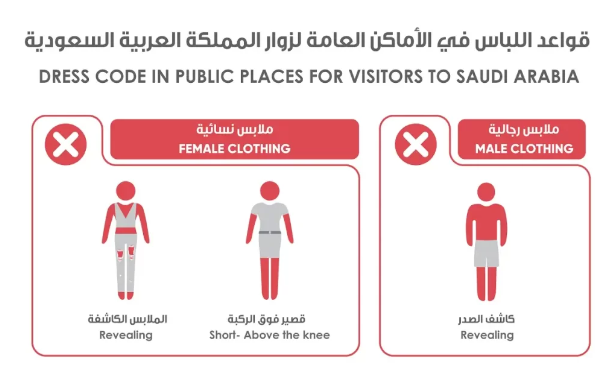

3. No Public Displays of Affection:
Public displays of affection, such as hugging or kissing, are frowned upon in Saudi Arabia. It is expected that displays of affection are limited to the private sphere.
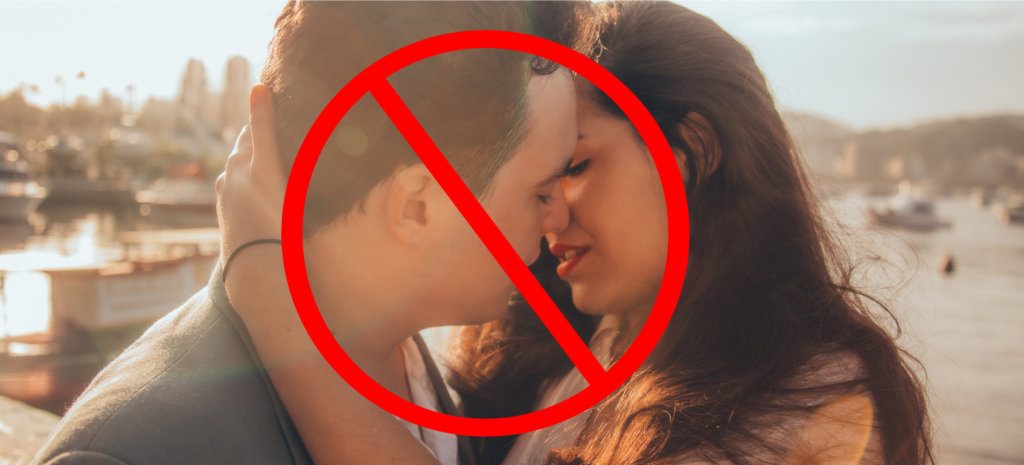
4. No Smoking in Public Places:
Smoking in public places, including restaurants and cafes, is prohibited in Saudi Arabia. You should look for designated smoking areas or refrain from smoking in public.

5. No Unauthorized Photography:
Do not take pictures of people without their permission . This is especially important in sensitive areas, such as near military facilities or government buildings.
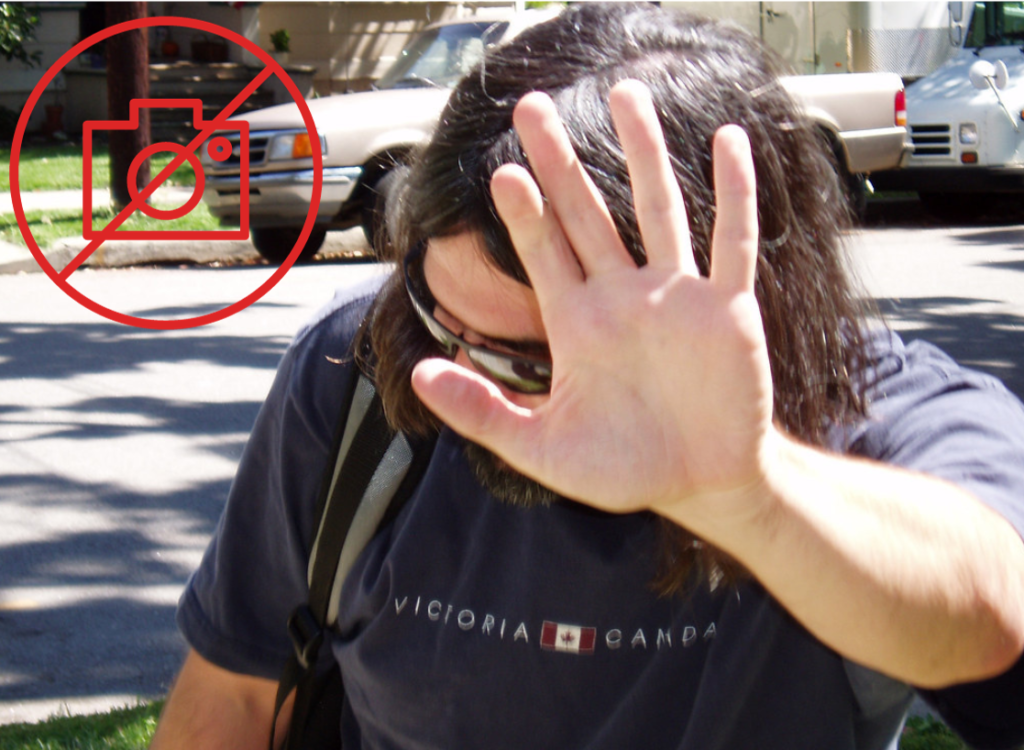
6. Respect Religious Customs:
Saudi Arabia is the holiest place in Islam, and visitors are expected to respect local religious customs. Avoid entering non-Muslim places of worship and adhere to prayer times.

7. No Eating or Drinking in Public During Ramadan:
During the holy month of Ramadan , Muslims fast from dawn until sunset. Non-Muslims should also refrain from eating or drinking in public during these hours as a sign of respect.

8. Avoid Gambling:
Gambling is prohibited in Saudi Arabia. Do not attempt to engage in gambling activities, as this could have serious legal consequences.

9. Do Not Criticize the Government or Religion:
Saudi Arabia has strict laws against defaming the government or religion . Avoid making critical comments about these subjects, as you could face legal problems.

10. Do Not Carry Prohibited Content:
Do not bring materials that may be considered obscene, politically sensitive , or contrary to cultural and religious norms of the country.
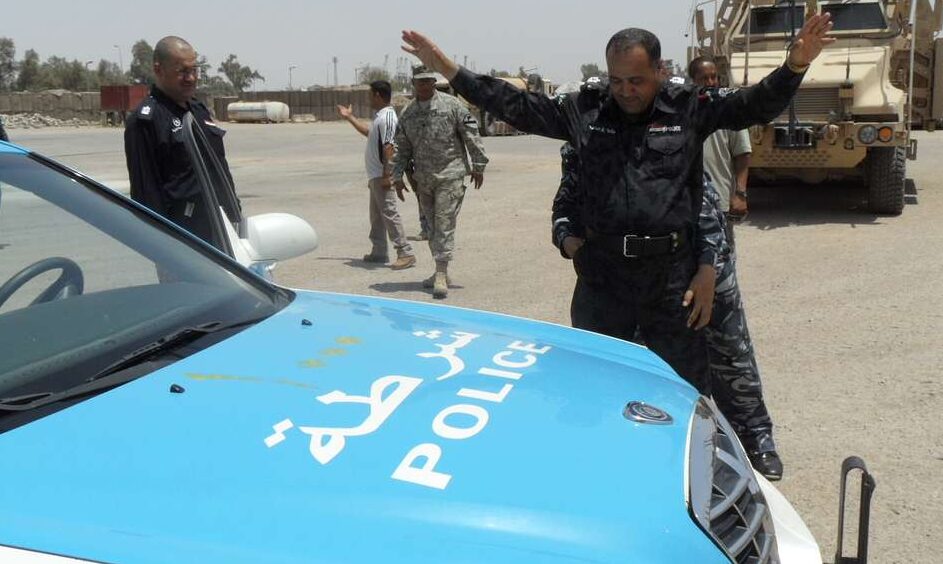
Conclusion:
Traveling to Saudi Arabia can be an enriching experience as long as you respect local rules and regulations. Knowing the 10 things you can’t do as a tourist in Saudi Arabia will help you enjoy your trip safely and respectfully. Remember that these rules apply to both locals and visitors, and respecting them is essential for a successful stay in this beautiful country.

- Switch skin
Saudi official rules out changing laws to introduce alcohol
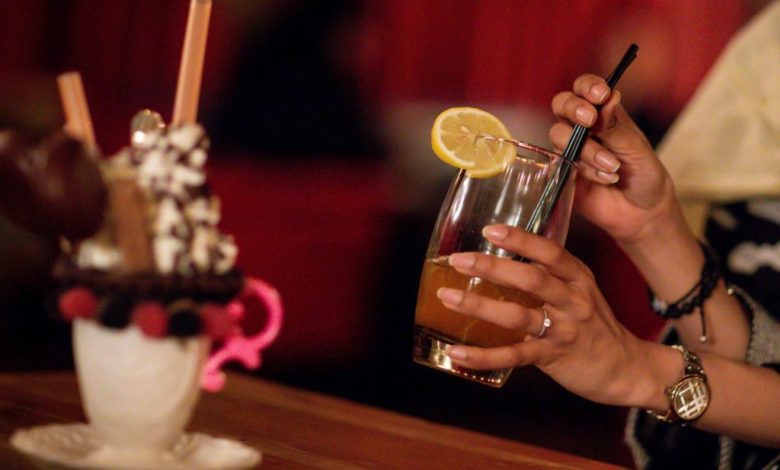
Assistant Minister of Tourism Princess Haifa Bint Mohammed ruled out the option to change laws in Saudi Arabia to introduce alcohol in the Kingdom.
The official was asked, in a panel session about Saudi Arabia at the World Economic Forum, about the possibility of offering alcohol in new destinations such as NEOM.
“The short answer is that we’re going to continue with our current laws.” The official pointed out that the Kingdom “is doing very well” when it comes to attracting tourists and opening the country for visitors from around the world.
Since the Kingdom introduced the new visa regime, the question that has been repeatedly asked quite often is whether the Kingdom will allow offering alcohol in public like other GCC neighbouring countries. Saudi officials have continuously refuted any claims that the country might loosen up on allowing alcohol in public.
Harshita Suresh
Saudi arabia’s neom signs major $100 million deal with pony.ai for driverless transport, bahrain welcomes 5.9 million visitors in first half of 2023, “we have the cash, we have the land”: saudi crown prince, oman: coastguards seize more than 1,200 cans of alcohol off musandam, saudi: marriot to open three hotels at neom’s new luxury island sindalah, qatar looks to boost technology and tourism sectors after buzz of world cup, saudi arabia’s neom, mega projects driving recruitment, pay hikes: report, saudi arabia’s yachting and golfing destination to open in 2024, saudi arabia reveals neom’s first luxury island sindalah, fifa world cup: alcohol sales banned at stadium sites, uae: new mobile visa screening clinic launched for workplaces, bahrain plans to double the size of its tourism in 5 years, related articles.

Saudi: Flying taxis to be available for transportation in NEOM

UAE prepares for promising tourism season as ‘World’s Coolest Winter’ approaches
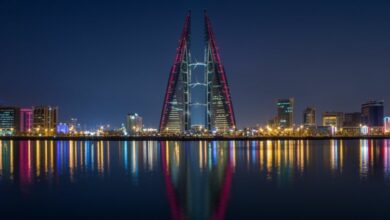
Bahrain Tourism Authority launches revamped tourism app

NEOM’s The Line to ‘go live fully’ on AI
- Politics & Security
- Economy & Business
What does Saudi's first-ever alcohol store say about new Gulf culture?
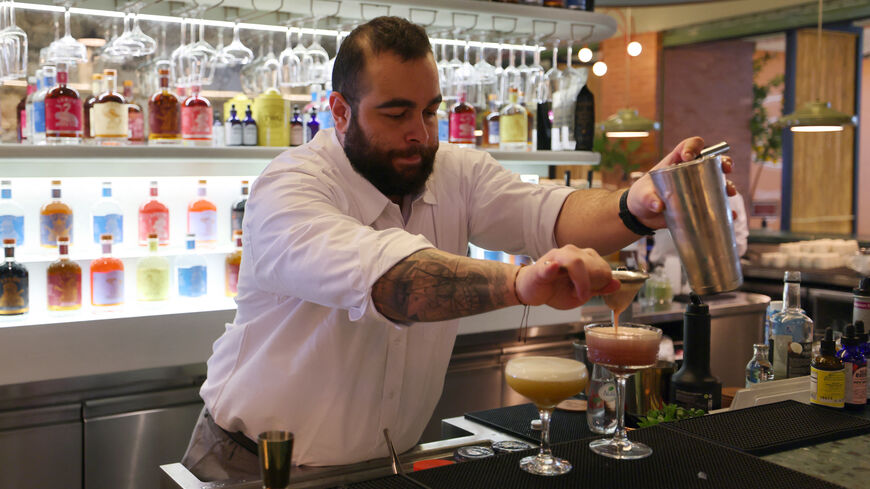
Saudi Arabia is planning to open its first liquor store for non-Muslim diplomats in the coming weeks, in the latest shift in the kingdom's conservative societal traditions and more broadly in the Gulf states' culture, where many countries are seeing the opening of alcohol shops and breweries.
Reuters, citing an undisclosed document and a source familiar with the plans, reported on Wednesday that Saudi Arabia was preparing to open the first such store in the capital, Riyadh. Customers will have to register via a mobile app, get a clearance code from the Saudi Foreign Ministry and then keep to monthly quotas with their purchases, the document reportedly stated.
The move is in line with Crown Prince Mohammed bin Salman's vision to transform the conservative country into a tourism, business and entertainment hub, and build an economy that is not reliant on oil revenues .
The new store will be in Riyadh’s Diplomatic Quarter, which houses many of the embassies and diplomats in the Saudi capital. Reuters reported that it would be “strictly restricted” to non-Muslims. Some foreign embassies in the quarter already serve drinks.
Saudi law around alcohol is in strict adherence with Islam, in which alcohol is forbidden. Those caught consuming or possessing alcohol can be fined, sent to jail or experience a public flogging; foreigners can be deported.
Bars have also been opening across the kingdom offering non-alcoholic cocktails, or “mocktails.” One pop-up bar in Riyadh organized by Blended by Lyre's serves alcohol-free Bellinis and spritzes in cocktail glasses.
UAE brewery
Meanwhile, in the United Arab Emirates, until recently all alcohol had to be produced overseas and shipped over.
However, Abu Dhabi published a subtle rule change in 2021 that allows license holders to make their own alcohol on-site. Following the change, Craft by Side Hustle plans to open the country’s first brewery in Abu Dhabi in February after a soft launch in December. The venue has a capacity of up to 280 people and will also serve Cajun food. Beers will cost around 45 dirhams ($12.25) a pint.
The Side Hustle brand was created in the UAE capital by a group of expats who wanted a taste of home.
Founder Chad McGehee, a native of southern Louisiana, moved to the Emirates around 14 years ago when he was working for IBM. His initial ambition was not to open a brewery in the Emirates.
“The inspiration was to create an authentic ‘local’ craft alcohol brand despite the fact brewing and distilling wasn’t allowed. I always thought of it through the lens of being local is more than just producing here,” McGehee told Al-Monitor.
“While it began as a way for myself and friends to enjoy beer styles we couldn’t get from the macro producers and their importers, it grew into a close-knit community of craft enthusiasts who helped us build the brand/branding and even create recipes,” he added.
McGehee said that his company’s cocktail, spirits and wine lists are all filled with “small batch, artisanal offerings” not available in the broader UAE.
When the brewery opened, Side Hustle already had a team of brewers with around 20 years of experience building and operating pubs internationally, so brewing alcohol wasn’t a challenge.
“The first real challenge I faced was to find partners who were experienced in Abu Dhabi food and beverages (an area in which Side Hustle lacked experience) and whose vision for what the capital’s first brew pub should be aligned with ours,” McGehee said.
He then partnered with co-founders Peter Samaha, Nadim Selbak, Adam Davis, Elias Kanaan and the team at Craft LTD to launch the brewery.
McGehee said there was little pushback given the rule change, but he worked with his colleagues to establish the venue in a way that respected the local culture and intent behind the new regulation.
Asked if there is a strong market for non-alcoholic beers in the UAE, he said, “Given the costs and process-specific nuances of producing non-alcoholic beer, we currently do not produce any and do not have a view on the market, but it is something we are exploring. We may consider adding to our offering in the near future should the right product become available.”
Related Topics
Sign up for our newsletter, daily briefing, the takeaway, week in review, business & tech briefing, security briefing, china-middle east briefing, gulf briefing, turkey briefing, israel briefing, palestine briefing, us confrontation with iran’s proxies: live q&a with jared szuba and elizabeth hagedorn.

The Israel-Hamas War: Live Q&A with Amb. David Satterfield (Part 2)

Choose your path to continue reading
Enjoy your complimentary article.
Provide your email and get free access to one article.
Thank you! Check your email to view your article.
You have already accessed your free article. Please consider subscribing to access all of Al-Monitor.
Or get unlimited all-access
Subscribe now to access all Al-Monitor content.
- All News & Analysis
- Memos & Reports
- All Newsletters
Oops! It looks like you already enjoyed your free article
To continue reading Al-Monitor articles, please subscribe.
Get unlimited all-access
- International edition
- Australia edition
- Europe edition
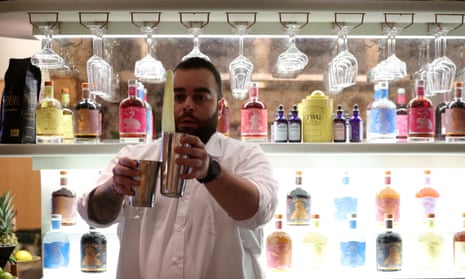
Saudi Arabia to allow first alcohol sales in 72 years, dividing opinion
Shop will be open only to non-Muslim diplomats – but some fear it is first step to wider availability of alcohol in teetotal kingdom
The news that Saudi Arabia will allow its first alcohol shop has citizens and foreigners alike mulling one question: is this a minor policy tweak, or a major upheaval?
Sources familiar with preparations for the store disclosed details of the plan on Wednesday, as a document circulated indicating just how carefully leaders of the teetotal Gulf kingdom will manage its operations.
Located in the capital’s Diplomatic Quarter, the store will be accessible only to non-Muslim diplomats, meaning that for the vast majority of Saudi Arabia’s 32 million people, nothing will change for now.
Additionally, purchasing quotas will be enforced. Access to the store will be restricted to those who register via an application. And customers will be asked to keep their phones in a “special mobile pouch” while they browse for beer, wine and spirits.
Still, some Riyadh residents told AFP they saw the development as the first step towards wider availability of alcohol, which would be a dramatic break from the nationwide prohibition that has been in place since 1952.
“This country keeps on surprising us,” said a Lebanese businessman dining on Wednesday night at LPM, a French restaurant in Riyadh known for its lengthy list of non-alcoholic wine and cocktails mixed behind an 18-metre (60-ft) long marble-top bar.
“It is a country that is developing, that is growing and that is attracting a lot of talent and a lot of investments. So yes, of course, there’s going to be much more.”
Yet like other diners at LPM, the businessman declined to be named, highlighting the sensitivity surrounding anything related to alcohol – which is banned in Islam – in the country that is home to the Muslim holy places of Mecca and Medina.
At another table, tucking into an order of hazelnut tiramisu, two Saudi men in their 30s said they worried about what the sale of alcohol would mean for the kingdom’s identity.
“It’s not who we are,” one of the men said.
“It’s not that I have, like, some kind of judgment towards people who drink. No, absolutely not. But having something that is out there affects the culture and the community.”
He added: “Let’s say if I have a younger sibling, if alcohol is out there, there is a possibility that he will become an alcoholic.”
His friend chimed in to say that he would prefer that people continue to go abroad to drink, as many do currently.
“It’s just scary that they’re allowing such things into [the country]. Any individual that wants to try alcohol, it’s literally an hour by plane away,” he said.
“Everybody travels here. It’s easily accessible. But what I want to say is that in this jurisdiction, I’m not happy that it’s allowed.”
Under his Vision 2030 reform agenda, Saudi Arabia’s de facto ruler, crown prince Mohammed bin Salman , is trying to turn the world’s biggest crude exporter into a business, sports and tourism hub that can prosper in an eventual post-oil era.
That requires luring more foreigners, and permitting alcohol “in stages” could play a role in that, said Kristin Diwan, of the Arab Gulf States Institute in Washington.
“This is one more step in normalising government sanction of alcohol in defined settings,” she said.
The government’s Center for International Communication said on Wednesday the new policy’s goal was “to counter the illicit trade of alcohol goods and products received by diplomatic missions”.
That was an apparent reference to the thriving local hidden market, where bottles of whisky frequently go for hundreds of dollars.
Framing the news this way “is likely intended to send a subtle message that change may be on the way, but that the process will be incremental and tightly controlled”, said Kristian Ulrichsen, fellow for the Middle East at Rice University’s Baker Institute for Public Policy.
For their part, restaurant industry insiders were unsure whether business would be affected in the immediate term.
“For the food and beverage industry, this doesn’t make a direct impact,” one manager said, though he added that if it alters how the outside world sees Saudi Arabia, “this could attract footfall towards the kingdom”, meaning more customers.
If access to alcohol in Saudi Arabia eventually expands beyond what sources described on Wednesday, those with the most to lose include vendors of mocktails and other non-alcoholic beverages, which are increasingly fashionable.
“It’s not a good thing for me. I’ll lose my business,” Evans Kahindi, brand manager for Blended by Lyre’s, a non-alcoholic spirits company, said with a laugh.
“There has always been speculation about having the real alcohol here … But to be honest, it’s with the government, we don’t know yet and I cannot speculate on anything.”
- Saudi Arabia
- Middle East and north Africa
- Mohammed bin Salman
Most viewed
Update April 12, 2024
Information for u.s. citizens in the middle east.
- Travel Advisories |
- Contact Us |
- MyTravelGov |
Find U.S. Embassies & Consulates
Travel.state.gov, congressional liaison, special issuance agency, u.s. passports, international travel, intercountry adoption, international parental child abduction, records and authentications, popular links, travel advisories, mytravelgov, stay connected, legal resources, legal information, info for u.s. law enforcement, replace or certify documents.
Before You Go
Learn About Your Destination
While Abroad
Emergencies
Share this page:
Saudi Arabia
Travel Advisory January 24, 2024
Saudi arabia - level 3: reconsider travel.
Updated after periodic review to provide information on the risk of arrest due to social media use and the importation of prohibited items.
Reconsider travel to Saudi Arabia due to the threat of missile and drone attacks. Exercise increased caution in Saudi Arabia due to terrorism, the risk of arrest based on social media activity, and importation of prohibited items. Some areas have increased risk. Read the entire Travel Advisory.
Do not travel to the following locations due to the threat of missile and drone attacks and terrorism :
- Within 50 miles of the Saudi-Yemen border, as well as the cities of Abha, Jizan, Najran, and Khamis Mushayt;
- Abha airport;
- Qatif in the Eastern Province and its suburbs, including Awamiyah.
Country Summary : U.S. government personnel under Chief of Mission responsibility must adhere to the above travel restrictions. As such, the U.S. government has limited ability to provide emergency services to U.S. citizens in these locations.
Missile and drone attacks perpetrated by Iran and Iran-supported militant groups have occurred as recently as September 2023. The Islamic Republic of Iran has in the past supplied Yemen-based Houthis and regional proxy groups with weapons to conduct destructive and sometimes lethal attacks using drones, missiles, and rockets against a variety of Saudi sites, including critical infrastructure, civilian airports, military bases, and energy facilities throughout the country, as well as vessels in Red Sea shipping lanes. Past attacks were aimed at targets throughout Saudi Arabia including Riyadh, Jeddah, Dhahran, Jizan, Khamis Mushayt, the civilian airport in Abha, Al Kharj, military installations in the south, as well as oil and gas facilities.
Debris from intercepted drones and missiles has also represented a significant risk to civilian areas and populations in the recent past. Militant groups have threatened to conduct attacks against locations in Saudi Arabia. U.S. citizens living and working near military bases and critical civilian infrastructure, particularly near the border with Yemen, are at heightened risk if missile, drone, or rocket attacks reoccur.
Terrorism continues to be a concern in Saudi Arabia. Attacks can occur with little or no warning. Past attacks have targeted tourist locations, large gatherings, transportation hubs, markets/shopping malls, and local government facilities. Terrorists are also known to time attacks around major holidays and/or in response to military operations. Terrorists have targeted both Saudi and international interests, mosques and other religious sites (both Sunni and Shia), and places frequented by U.S. citizens.
Be advised that social media commentary – including past comments – which Saudi authorities may deem critical, offensive, or disruptive to public order, could lead to arrest . This may include posting, re-posting, or liking comments about Saudi institutions, policies, and public life. U.S. citizens have been convicted for social media activity under Saudi laws concerning cybercrime, terrorism, and disrupting public order. Punishment for social media activity has included prison sentences of up to 45 years in some cases. Saudi courts do not necessarily consider the timeframe of the posts or the location from which they were made to be material to these cases.
The importation of drugs (including marijuana), drug paraphernalia, alcohol, weapons, pork, or any materials that could be considered pornographic or suggestive, is prohibited. Penalties for drug possession, consumption, and trafficking are severe by U.S. standards. An extensive list of banned items is available on our Saudi Arabia country information page .
Due to risks to civil aviation operating within the Persian Gulf and the Gulf of Oman region, including Saudi Arabia, the Federal Aviation Administration (FAA) has issued an advisory Notice to Air Missions (NOTAM). For more information U.S. citizens should consult the Federal Aviation Administration’s Prohibitions, Restrictions and Notices .
Read the country information page for additional information on travel to Saudi Arabia.
If you decide to travel to Saudi Arabia:
- Visit our website for information on travel to high-risk areas .
- Stay alert in large crowds and/or locations frequented by foreign nationals.
- Obtain comprehensive medical insurance that includes medical evacuation.
- Review local laws and conditions before traveling, including our Saudi Arabia country information on arrest notification and the Department of State’s general information on arrests of U.S. citizens abroad .
- Enroll in the Smart Traveler Enrollment Program ( STEP ) to receive Alerts and make it easier to locate you in an emergency.
- Follow the Department of State on Facebook and Twitter .
- Follow the U.S. Embassy in Saudi Arabia on Facebook and Twitter .
- Review the Country Security Report for Saudi Arabia.
- Visit the CDC page for the latest Travel Health Information related to your travel.
- Prepare a contingency plan for emergency situations. Review the Traveler’s Checklist .
Yemen Border, Abha airport, and Qatif in the Eastern Province and its suburbs, including Awamiyah – Level 4: Do Not Travel
Militants in Yemen have attacked Saudi border towns and other sites in Saudi Arabia with armed drones, missiles, and rockets . Civilians that are near the border with Yemen are especially at risk. Terrorist groups continue plotting possible attacks in Saudi Arabia, including in Qatif.
The U.S. government has limited ability to provide emergency services to U.S. citizens within 50 miles of the Saudi-Yemen border as U.S. government personnel and their families are restricted from travel to this area.
Visit our website for information on travel to high-risk areas
Embassy Messages
View Alerts and Messages Archive
Quick Facts
A valid passport is required for U.S. citizens to enter or exit the Kingdom of Saudi Arabia. A minimum of six months’ validity beyond the date of travel is recommended.
One page required for entry stamp.
Required for certain visa classes
More than 16,000 USD must be declared. Customs details are here .
Embassies and Consulates
The normal work week in Saudi Arabia is Sunday through Thursday.
U.S. Embassy Riyadh Abdullah Ibn Hudhafah As Sahmi Street Roundbaout no. 9, Diplomatic Quarter Riyadh, Saudi Arabia Telephone: (966) (11) 488-3800 Emergency Telephone: (966) (11) 488-3800 Fax: (966) (11) 488-7670 [email protected]
U.S. Consulate General Jeddah Al Safa Street, Al Muhammadiyah District, near the new American School building. Jeddah, Saudi Arabia Telephone: (966) (12) 220-5000 Fax: (966) (12) 220-5093 [email protected]
U.S. Consulate General Dhahran Off King Saud bin Abdulaziz Road, at the corner of Salaheddin al Ayoubi Street and Prince Fahd bin Sultan bin Abdulaziz Street, Dhahran, Saudi Arabia Telephone: (966) (13) 839-5700 Emergency Telephone: (966) (13) 839-5700 Fax: (966) (13) 330-6816 [email protected]
Destination Description
Learn about the U.S. relationship to countries around the world.
Entry, Exit and Visa Requirements
See the Embassy of Saudi Arabia’s website for visa information.
COVID-19 Requirements: There are no COVID-related entry requirements for U.S. citizens.
For residency permit-holders (iqama), an exit/reentry permit is required to leave Saudi Arabia as well as six month’s validity on your passport to request an exit/reentry permit.
- Saudi law requires that residency permit-holders carry their residency card (iqama) at all times while in the Kingdom. Failure to do so could result in a fine of 3,000 Saudi riyals and a jail sentence of six weeks.
- Females and minors may require a male guardian’s permission to leave the country, including U.S. citizens or dual-nationals.
- You must exit Saudi Arabia using the passport for the nationality corresponding to the one on which you entered Saudi Arabia.
Saudi law requires all Saudi citizens to enter and depart the country with a Saudi travel document. If you enter the country on a Saudi laissez-passer (temporary travel document), you may encounter difficulty leaving the Kingdom.
Saudi embassies do not have the authority to adjudicate citizenship claims or issue passports, but they may issue a laissez-passer for presumed Saudi citizens for whom citizenship has not been adjudicated, such as children of a Saudi parent or parents who were married outside of Saudi Arabia. Once admitted to Saudi Arabia on a laissez-passer, the traveler must obtain a Saudi passport before leaving the country. Saudi nationality is not conferred quickly or easily, and the processing time for a Saudi passport in these cases has often been six months or years in some cases. Obtaining a U.S. passport will not help, as you will not be able to leave Saudi Arabia without an exit visa which will not be granted if you entered as a Saudi citizen.
The Department strongly recommends that U.S. citizens enter Saudi Arabia on a U.S. passport and Saudi visa, and not a laissez-passer.
Length of Stay: Bearers of tourist visas are generally admitted for a 90-day stay and may not remain in the Kingdom more than 180 days in a twelve month period. Carefully check your visa validity and length of stay granted, and clarify any questions on permitted length of stay with Saudi immigration officials on arrival. Dates are calculated in accordance with the Hijri calendar, which differs from the Gregorian calendar.
If you overstay your visa, you could face significant fines, detention, and/or deportation, and a ban from returning to Saudi Arabia.
The U.S. Embassy is unable to intercede, reduce fines, or prevent incarceration if you violate Saudi law.
Travel Bans: When placed under a travel ban, you cannot exit the country, even if you are a U.S. citizen or a dual U.S.-Saudi citizen. Travel bans are rigidly enforced and can take months or even years to resolve. Only Saudi Arabian authorities and sponsors can remove travel bans.
The government may issue travel bans on people who are/have:
- charged with criminal offenses;
- under investigation;
- involved in financial or labor disputes;
- failed to report to work according to the terms of the contract (absconded);
- unpaid debts or who have passed bad checks.
The list above is not exhaustive. Private Saudi citizens may also initiate travel bans against foreign citizens for various reasons.
Residency Permits: If you are seeking residency in Saudi Arabia, make sure you have all required legal documents authenticated before arriving. Neither the U.S. Embassy in Riyadh nor the U.S. Consulates General in Jeddah or Dhahran can provide this service.
You should have all U.S. issued documents authenticated by the Department of State Office of Authentications (202-485-8000) and attested by the Embassy of Saudi Arabia in Washington D.C.
Work Visas: If you plan on working in Saudi Arabia, you must obtain a work visa before you arrive. Foreigners working in Saudi Arabia are subject to the country’s sponsorship system, which concedes substantial legal authority over the worker to the employer. This can include the ability to prevent the employee from leaving the country. American citizens considering working in Saudi Arabia should carefully review the information about employment in the “Local Laws and Special Circumstances” section below.
If the visitor or business visa has been annotated “not permitted to work,” you are not allowed to legally work in Saudi Arabia. You risk substantial financial penalties, detention, deportation, and a ban from returning to Saudi Arabia if you work without legal permission. Additionally, without a work visa, there would be no legal grounds to pursue a case against an employer should a dispute arise.
HIV/AIDS: To obtain work and residence permits, you are required to obtain a medical report or physical examination confirming that you are free from contagious diseases, including HIV/AIDS and hepatitis. If you test positive for HIV/AIDS or hepatitis, you will not be allowed to work in the Kingdom. Saudi Arabia has not imposed HIV/AIDS or hepatitis travel restrictions on other categories of travelers. Please inquire directly with the Embassy of Saudi Arabia before you travel.
Vaccinations: Visitors to Saudi Arabia should check vaccination requirements on the Saudi Ministry of Health website.
Yemen Travel: The Department strongly advises U.S. citizens against travel to Yemen due to the ongoing conflict in that country. See our Yemen Travel Advisory for further information. A visa is required to enter Saudi Arabia, and Saudi authorities generally do not permit foreign citizens to enter Saudi Arabia using land border crossings from Yemen. The Embassy and Consulates General cannot provide assistance to U.S. citizens seeking to cross the Yemeni-Saudi border.
Safety and Security
The Department of State advises you to exercise increased caution when traveling to Saudi Arabia due to terrorism and the threat of missile and drone attacks on civilian targets. See the Travel Advisory for Saudi Arabia here .
Do not travel:
- Within 50 miles of the border with Yemen due to terrorism and armed conflict.
Terrorist groups continue plotting possible attacks in Saudi Arabia. Terrorists may attack with little or no warning, targeting tourist locations, transportation hubs, markets/shopping malls, and local government facilities. Terrorists have targeted both Saudi and Western government interests, mosques and other religious sites (both Sunni and Shia), and places frequented by U.S. citizens and other Westerners.
Houthis operating in Yemen have fired long-range missiles into Saudi Arabia, specifically targeting populated areas and civilian infrastructure; they have publicly stated their intent to continue doing so. Missile attacks have targeted major cities such as Riyadh and Jeddah, Riyadh’s international airport, Saudi Aramco facilities, and vessels in Red Sea shipping lanes. Rebel groups are also in possession of unmanned aerial systems (UASs or drones) which they have used to target civilian infrastructure and military facilities in Saudi Arabia. U.S. citizens living and working on or near such installations, particularly in areas near the border with Yemen, are at heightened risk of missile and drone attack.
On October 11, 2018 the Saudi General Authority for Civil Aviation issued a Notice to Airmen about threats to civil aviation and airports in Saudi Arabia posed by missiles and UASs launched from Yemen. For more information, U.S. citizens should consult the U.S. Government’s Defense Internet NOTAM Service (Type “OEJD” in the search field, then click “View NOTAMs,” then scroll down to W0438/18 and click to view).
The U.S. government has limited ability to provide emergency services to U.S. citizens in the following locations as U.S. government personnel and their families are restricted from travel to:
- Within 50 miles of the Saudi-Yemen border, including the cities of Jizan and Najran;
- Qatif in the Eastern province and its suburbs, including Awamiyah.
You can find additional details relating to safety and security in our Travel Advisory and Alerts and the website of the U.S. Mission in Saudi Arabia .
Crime: Crime in Saudi Arabia has increased over recent years but remains at levels far below most major metropolitan areas in the United States.
- You should be aware of your surroundings, keep valuables out of sight and secure, and travel with a companion, if possible.
- Some Saudi citizens who perceive that a foreigner is not observing conservative standards of conduct or dress have been known to harass, pursue, or assault that person.
- Even when released from detention, witnesses to criminal incidents may be prohibited from leaving the country until investigation of the incident is complete.
See the websites of the Department of State and the FBI for information on scams.
Victims of Crime: If you or someone you know becomes the victim of a crime, you should contact the local police at “999” and contact the Embassy in Riyadh or one of the Consulates in Jeddah or Dhahran.Remember that local authorities are responsible for investigating and prosecuting the crime.
See the Department of State’s webpage on help for U.S. victims of crime overseas .
The Department can:
- help you identify appropriate medical care;
- assist you in reporting a crime to the police;
- contact relatives or friends with your written consent;
- explain the local criminal justice process in general terms;
- provide a list of local attorneys;
- provide information on victim’s compensation programs in the U.S. ;
- provide an emergency loan for repatriation to the United States and/or limited medical support in cases of destitution;
- help you find accommodation and arrange flights home;
- replace a stolen or lost passport.
Domestic Violence: If you are the victim of any form of physical violence, including domestic violence, you should contact the Saudi police by calling “999”. In addition, victims of domestic violence can contact the Saudi National Domestic Violence Hotline by dialing “1919.” The Saudi Ministry of Labor and Social Development runs a network of shelters for women and children. Contacting the domestic violence hotline (“1919”) is the only way to access these shelters. The Saudi National Family Safety Program also runs a Child Help Line “116111” and can assist children in accessing Saudi social services.
When reporting domestic violence, it is imperative to get a case reference number as all Saudi social and legal assistance is tied to this case number. It is also a good idea to document any injuries and obtain a copy of any medical reports. U.S. citizens should be advised that filing a police report or utilizing any Saudi victims’ assistance services may result in the Saudi authorities informing your sponsor or guardian.
U.S. citizen victims of domestic violence may contact the Embassy or Consulates for assistance.
Tourism: The tourism industry is unevenly regulated, and safety inspections for equipment and facilities do not commonly occur. Hazardous areas/activities are not always identified with appropriate signage, and staff may not be trained or certified either by the host government or by recognized authorities in the field. In the event of an injury, appropriate medical treatment is typically available only in/near major cities. First responders are generally unable to access areas outside of major cities and to provide urgent medical treatment. U.S. citizens are encouraged to purchase medical evacuation insurance. See our webpage for more information on insurance providers for overseas coverage .
Local Laws & Special Circumstances
Dual Citizenship: Saudi Arabia generally does not recognize dual nationality. Saudi law requires Saudi citizens to obtain official permission from the government before obtaining a second nationality. At times, Saudi authorities have confiscated the passports of U.S. citizens applying for Saudi citizenship. This does not constitute loss of U.S. citizenship. If this happens to you or someone you know, report the incident to the U.S. Embassy.
Arrest Notification: If you are arrested or detained, ask police or prison officials to notify the U.S. Embassy or consulate immediately. Be aware that Saudi Arabia generally restricts consular notification of the arrest of foreigners to the Embassy of the country that issued the travel document used to enter the Kingdom. If you enter Saudi Arabia with a Saudi travel document, or with the passport of a country other than the United States, it will be extremely difficult for the U.S. Embassy to provide consular services if you are subsequently detained. Persons detained in Saudi Arabia may be held without charges for lengthy periods and denied access to counsel; dual citizens may not have consular assistance. See the Embassy’s webpage for further information.
Drones: The importation of drones for commercial or personal use is prohibited without prior approval from the General Authority for Civil Aviation (GACA). A customs clearance certificate authorizing importation can be obtained as part of the GACA approval process. Visit GACA’s website for further information.
Criminal Penalties: While in Saudi Arabia, you are subject to local laws. If you violate Saudi laws, even unknowingly, you may be expelled; arrested; imprisoned; held without trial for lengthy periods of time; interrogated without counsel; subject to corporal punishments, including lashings; or executed.
Penalties for the import, manufacture, possession, and consumption of alcohol or illegal drugs in Saudi Arabia are severe. Convicted offenders can expect long jail sentences, heavy fines, public floggings, and deportation. The penalty for drug trafficking is death. Furthermore, some laws are prosecutable in the United States regardless of local law. For examples, see our webpage on crimes against minors abroad and the Department of Justice website .
There are substantial limitations on freedom of speech and political expression in Saudi Arabia. For additional information see the Department of State’s Human Rights Report for Saudi Arabia .
Faith-Related Travel Issues: Islam is the official religion of the country and is present in all aspects of life in Saudi Arabia. See our Hajj and Umrah Fact Sheet .
- Saudi authorities do not permit criticism of Islam or Muslim religious figures, including on social media.
- The government prohibits the public practice of religions other than Islam. Non-Muslims suspected of violating these restrictions have been jailed and/or deported. Church services in private homes have been raided, and participants have been jailed and/or deported.
- Muslims who do not adhere to the strict interpretation of Islam prevalent in much of Saudi Arabia may encounter societal discrimination and constraints on public worship.
- Public display of non-Islamic religious articles, such as crosses and Bibles, is not permitted.
- Non-Muslims are forbidden to travel to Mecca and parts of Medina, the cities where two of Islam’s holiest mosques are located.
- See the Department of State’s International Religious Freedom Report .
LGBTI Travelers: Same-sex sexual relations, even when consensual, are criminalized in Saudi Arabia. Violations of Saudi laws governing perceived expressions of, or support for, same-sex sexual relations, including on social media, may be subject to severe punishment. Potential penalties include fines, jail time, or death. See our LGBTI Travel Information page and section 6 of the Department of State's Human Rights report for further details.
Travelers Who Require Accessibility Assistance: Individuals with disabilities may find accessibility and accommodation very different from what is generally found in the United States. Saudi law does not prohibit discrimination against people with disabilities, and there is no legislation requiring public accessibility. Newer commercial and government buildings, however, often include such access. According to the Ministry of Labor and Social Development, there are numerous government-sponsored centers for people with disabilities. Note that Saudi Arabia has limited infrastructure to care for those with mental disabilities.
Students: See the Department’s Students Abroad page and FBI travel tips .
Women Residents and Travelers: Married women, including non-Saudis, require their husband's permission to depart the country, while unmarried women and children require the permission of their father or male guardian.
Minor children must have their father’s permission in order to leave the Kingdom. Children visiting their fathers in Saudi Arabia, even when there is a custody agreement, can be prevented from leaving unless the father consents. This is true even if the child is an American citizen. The U.S. Embassy and Consulates cannot obtain exit visas for the departure of minor children without their father/guardian's permission.
If a foreigner and a Saudi living in Saudi Arabia divorce, Saudi courts rarely grant permission for the foreign parent to leave the country with the children born during the marriage, even if he or she has been granted physical custody.
Foreign mothers of Saudi children, who are divorced or widowed, may apply for a permanent residency permit(iqama) without the need for a sponsor. To do so, they must prove maternity and that they were legally married to the Saudi father.
Also see the Department’s travel tips for Women Travelers .
Employment: The Arabic text of a contract governs employment and business arrangements under Saudi law. Verbal assurances or side letters are not binding under Saudi law. In the event of any contract dispute, Saudi authorities refer to the written contract.
- Sponsors have wide latitude and responsibilities for employees and family members under their sponsorship, including obtaining residence permits for the employee and for any family members.
- All residents should be issued a Saudi residence permit (iqama) and are legally required to carry it at all times.
- The U.S. Embassy and Consulates General in Saudi Arabia cannot sponsor private U.S. citizens for Saudi visas.
- Sponsors have been known to demand that residents working in Saudi Arabia surrender their passports while in the Kingdom. Such practices are illegal and should be reported to the Ministry of Labor and Social Development .
- Since the Saudi sponsor controls the issuance of exit permits, U.S. citizens may be prevented by the sponsor from leaving Saudi Arabia in the event of a labor or business dispute, which could take months or years to resolve.
- To change employers within the Kingdom, Saudi Arabia requires the written permission of the original sponsoring employer.
- The U.S. Embassy and U.S. Consulates General cannot assist in labor or business disputes, nor can they provide translation or legal services.
- U.S. consular officers can provide lists of local attorneys to help U.S. citizens settle business disputes, but ultimate responsibility for the resolution of disputes through the Saudi legal system, and payment for those services, lies with the parties involved. For additional information on Saudi labor law, please refer to the Ministry of Labor and Social Development’s webpage .
- Saudi customs authorities enforce strict regulations concerning the importation of such banned items as alcohol, weapons, and any item that is held to be contrary to the tenets of Islam (such as pork, anything considered pornographic under strict Islamic principles, and religious materials).
- Imported and domestic audiovisual media and reading matter are censored.
- Christmas and other holiday decorations, fashion magazines, and "suggestive" videos may be confiscated and the owner subject to penalties and fines.
- Electronic devices may be subject to inspection upon entry or exit. Please see the Department’s Customs Information page as well as the Saudi Customs webpage.
Importing Animals: The Saudi Ministry of Agriculture must approve all pets imported into Saudi Arabia.
- Cats and dogs entering Saudi Arabia require a Veterinary Health Certificate and a dated letter from the veterinary practitioner addressed to his/her sponsor to obtain the necessary approval from the Ministry of Agriculture.
- Both documents must be authenticated by the Department of Agriculture Veterinary Service Office and the State Department's Authentications Office and attested by the Embassy of Saudi Arabia .
- The certificate must indicate that the animal was examined and is free from disease and confirm that rabies and other vaccines are current. Information on the name, breed, sex, color, and age of the animal must also be stated.
- Please see additional information on taking a pet overseas .
Teaching English in Saudi Arabia: In recent years, increasing numbers of American language teachers have experienced contractual and other problems. Some teachers have complained about arbitrary dismissals, difficult living conditions, salary arrears, unwanted reassignments, restrictions on their movement, and inability to leave the country. Prospective teachers in Saudi Arabia should vet their potential employer and carefully review their employment offer as well as the detailed information found in the Embassy’s Guide to Teaching English in Saudi Arabia . Additionally, prospective teachers should also take care to make sure that they obtain the appropriate work visa prior to coming to Saudi Arabia. The Embassy cannot help you if you violate Saudi labor law.
Standards of Conduct and Religious Police: Norms for public behavior in Saudi Arabia are extremely conservative. Both the uniformed police and the religious police, referred to colloquially as the mutawwa or al-hay’a, are charged with enforcing these standards.
- Mutawwa are required to carry special identification and usually are accompanied by uniformed police.
- While a 2016 government decree withdrew the authority of the mutawwa to make arrests independently of regular police forces, visitors should be prudent in their interactions with mutawwa.
- An individual must, if requested, present his/her residence permit (iqama) or other identification to the mutawwa or the police.
- U.S. citizens who are involved in an incident with the mutawwa should report the incident to the U.S. Embassy in Riyadh or the U.S. Consulates General in Jeddah or Dhahran.
In most areas of Saudi Arabia, and particularly in Riyadh and the central part of the Kingdom, women wear a full-length covering known as an abaya. Most women in conservative areas also cover their hair with a hijab for modesty, and many also cover their faces with a niqab.
Tourists are expected to dress modestly in public, avoiding tight fitting clothing or clothes with profane language or images; women are not required to wear abayas or cover their hair but are expected to cover their shoulders and knees, and men should not go without a shirt. Women who choose not to conform to Saudi Arabia’s dress code face a risk of confrontation by mutawwa, negative or hostile comments by Saudi citizens, and possible detention Guidelines on public decorum for tourists are available at the Saudi government’s official tourism website, www.visitsaudi.com. Many areas of life in Saudi Arabia are segregated by sex to ensure that unrelated men and women have no possibility of mingling (a punishable crime) by unmarried men and women. Less frequently, members of the mutawwa try to enforce this by asking for proof that a couple is married or related. Men and women detained for socializing with individuals who are not relatives may be charged with moral crimes such as khulwa (mixing with unrelated members of the opposite sex). Less frequently, some restaurants may refuse to serve women who are not accompanied by a close male relative In addition, a few restaurants or cafes do not have a "family section" in which women are permitted to eat. Men not accompanied by a close female family member are not allowed to enter family sections and cannot use services (such as registers at supermarkets) designated as “family.” These restrictions are not always clearly posted.
While there are now movie theaters, musical concerts, and artistic performances in Saudi Arabia, the country remains socially conservative. Social media postings which contravene cultural standards can have legal and/or criminal consequences.
Photography: The Saudi government does not permit photography of governmental facilities, such as military bases and government buildings, nor military, security, or police personnel. The Saudi government is also sensitive to photographs that may be perceived as portraying the country in an unfavorable light. This policy can include photos of mosques, impoverished areas, the local population, and traditional souks (markets). You should not take anyone’s picture without clear consent, and never take a picture of a woman or a place where women congregate. Be aware of local sensitivities whenever you are taking pictures in public. U.S. citizens have been routinely detained for violating these policies. The U.S. Embassy and Consulates General are unable to intervene if you violate Saudi law.
The Hajj and Umrah: Please review the Department of State’s Hajj and Umrah Fact Sheet for useful information on traveling to perform the Hajj or Umrah.
COVID-19 Testing: COVID-19 testing is available to U.S. citizens throughout Saudi Arabia at public and private facilities. Private hospitals and clinics charge a fee for COVID-19 testing. Cost, delivery method, and timing of results varies. Some facilities can electronically deliver results within 24 hours or less.
COVID-19 Vaccines: The COVID-19 vaccine is available for U.S. citizens to receive in Saudi Arabia. For more information, please see the Ministry of Health’s website.
Visit the FDA's website to learn more about FDA-approved vaccines in the United States.
Medical care varies greatly in quality, and high-profile cases of medical malpractice and errors have occurred. Consult your regular physician if you are considering serious medical treatment in Saudi Arabia.
The U.S. Embassy and U.S. Consulates General do not pay medical bills. Be aware that U.S. Medicare does not apply overseas.
Medical Insurance: Make sure your health insurance plan provides coverage overseas. Most care providers in Saudi Arabia accept cash or credit card payments. See the Department’s webpage for more information on insurance providers for overseas coverage . Supplemental insurance to cover medical evacuation is strongly recommended. If you are covered by Saudi insurance, be sure to read the fine print: local insurance can have exclusions that are unusual in the United States. For example, some local policies may not supply coverage for accidents that occur while engaging in adventure sports, such as riding quad vehicles in the desert, that are a common past-time for expatriates.
If traveling with prescription medication, check with the government of Saudi Arabia to ensure the medication is legal in Saudi Arabia. Always carry your prescription medication in original packaging, along with your doctor’s prescription.
Please note:
- Saudi Arabia has a dry climate with extreme heat several months of the year – travelers should stay hydrated.
- Air pollution is a significant concern in many parts of Saudi Arabia including Riyadh, Al Jubail, Jeddah, and Dammam.
- Many infectious diseases, such as measles, typhoid, dengue, and Middle East Respiratory Syndrome (MERS), are present in Saudi Arabia.
Be up-to-date on all vaccinations recommended by the U.S. Centers for Disease Control and Prevention.
For further health information, go to:
- World Health Organization (WHO)
- U.S. Centers for Disease Control and Prevention (CDC)
- Saudi Ministry of Health
Medical care varies greatly in quality, and high profile cases of medical malpractice and errors have occurred. Consult your regular physician if you are considering serious medical treatment in Saudi Arabia.
We do not pay medical bills. Be aware that U.S. Medicare does not apply overseas.
Medical Insurance: Make sure your health insurance plan provides coverage overseas. Most care providers overseas only accept cash payments. See our webpage for more information on insurance providers for overseas coverage . We strongly recommend supplemental insurance to cover medical evacuation. If you are covered by Saudi insurance, be sure to read the fine print: local insurance can have exclusions that are unusual in the United States. For example, some local policies may not supply coverage for accidents that occur while engaging in adventure sports, such as riding quad vehicles in the desert, that are a common past-time for expats.
Always carry your prescription medication in original packaging, along with your doctor’s prescription.
If traveling with prescription medication, check with the government of Saudi Arabia to ensure the medication is legal in Saudi Arabia. Always carry your prescription medication in original packaging, along with your doctor’s prescription.
For health-related information on the Middle East respiratory syndrome coronavirus (MERS-CoV), formerly called “novel coronavirus,” visit the CDC’s MERS-CoV webpage .
Be up-to-date on all vaccinations recommended by the U.S. Centers for Disease Control and Prevention.
- World Health Organization
- U.S. Centers for Disease Control and Prevention (CDC)
Travel and Transportation
Road Conditions and Safety: Driving in Saudi Arabia can be hazardous due to speeding and aggressive driving, lax enforcement of traffic regulations, and a high volume of traffic.
Beginning on June 24, 2018, women have been able to obtain a driver’s license and can legally drive in Saudi Arabia. With a valid visitor visa and U.S. or international driver’s license, visitors may drive a rental car. However, outside the major cities of Riyadh, Dhahran and Jeddah, visitors—especially women—may experience difficulty renting a car. Female residents with independent sponsorships and U.S. or international driver’s licenses also may obtain a Saudi driver’s license, necessary to drive vehicles other than rental cars. Foreign women residing in Saudi Arabia who are listed as dependents on their Saudi residency permit (“iqama”) may experience difficulties in obtaining Saudi driver’s licenses. To drive vehicles other than rental cars, a Saudi driver’s license, appropriate car registration, and auto insurance are required. Police may detain you if you cannot produce these documents.
See the Saudi Arabian Ministry of Interior website for further information.
Traffic Laws :
- Temporary visitors may drive using their valid U.S. or international driver's license for up to 90 days.
- Foreigners resident in Saudi Arabia who wish to drive must obtain a local driver's license from the Department of Traffic Police.
- In the event of a traffic accident, U.S. citizens should dial “993” to report the accident. You must remain on the scene until the traffic police arrive. Failure to do so can result in a criminal offense.
- Additionally, U.S. citizens should contact Najm, a private company contracted by the traffic police to complete the accident report (+966 9200 00560).
- In the event of a traffic accident resulting in personal injury, everyone involved (if not seriously injured) is likely be taken to the local police station.
- All drivers, regardless of fault, can be held in custody for several days until responsibility is determined and any reparations paid.
- Use of front seat belts (driver and passenger) is required by law.
- U.S. citizens involved in a serious accident resulting in injury or death should immediately contact their sponsors and the U.S. Embassy or nearest U.S. Consulate.
- Residents should update their personal details through one of the methods available here to receive SMS notifications once a traffic ticket is issued.
- Delay in payment of any ticket might result in doubling of the ticket amount.
- Travelers will need to pay any fines issued through this system before leaving the country.
Public Transportation:
- U.S. Government employees are prohibited from using taxis in Saudi Arabia with the exception of Uber Black in Riyadh, Kareem First in Jeddah, and Majestic taxi service in Dhahran. If you must use a taxi, only use established companies, such as those offering cabs with meters. Taxis and lift services are available throughout major cities, and you should arrange a pickup by telephone or via smartphone app when possible.
- Avoid sitting in the front seat of a taxi, do not travel to unfamiliar areas, and do not enter taxis with unknown passengers.
Please refer to the Department’s Road Safety page for more information. Also, it is recommended that you visit the website of the Saudi Arabian Ministry of Interior .
Aviation Safety Oversight: The U.S. Federal Aviation Administration (FAA) has assessed the Government of Saudi Arabia's Civil Aviation Authority as being in compliance with International Civil Aviation Organization aviation safety standards for oversight of Saudi Arabia's air carrier operations. Further information may be found on the FAA safety assessment page .
Information for Mariners:
Mariners should also review U.S. maritime alerts and advisories on the Maritime Security Communications with Industry Web Portal .
For additional travel information
- Enroll in the Smart Traveler Enrollment Program (STEP) to receive security messages and make it easier to locate you in an emergency.
- Call us in Washington, D.C. at 1-888-407-4747 (toll-free in the United States and Canada) or 1-202-501-4444 (from all other countries) from 8:00 a.m. to 8:00 p.m., Eastern Standard Time, Monday through Friday (except U.S. federal holidays).
- See the State Department’s travel website for the Worldwide Caution and Travel Advisories .
- Follow us on Twitter and Facebook .
- See traveling safely abroad for useful travel tips.
Review information about International Parental Child Abduction in Saudi Arabia . For additional IPCA-related information, please see the International Child Abduction Prevention and Return Act ( ICAPRA ) report.
Travel Advisory Levels
Assistance for u.s. citizens, saudi arabia map, learn about your destination, enroll in step.

Subscribe to get up-to-date safety and security information and help us reach you in an emergency abroad.
Recommended Web Browsers: Microsoft Edge or Google Chrome.
Check passport expiration dates carefully for all travelers! Children’s passports are issued for 5 years, adult passports for 10 years.
Afghanistan
Antigua and Barbuda
Bonaire, Sint Eustatius, and Saba
Bosnia and Herzegovina
British Virgin Islands
Burkina Faso
Burma (Myanmar)
Cayman Islands
Central African Republic
Cote d Ivoire
Curaçao
Czech Republic
Democratic Republic of the Congo
Dominican Republic
El Salvador
Equatorial Guinea
Eswatini (Swaziland)
Falkland Islands
France (includes Monaco)
French Guiana
French Polynesia
French West Indies
Guadeloupe, Martinique, Saint Martin, and Saint Barthélemy (French West Indies)
Guinea-Bissau
Isle of Man
Israel, The West Bank and Gaza
Liechtenstein
Marshall Islands
Netherlands
New Caledonia
New Zealand
North Korea (Democratic People's Republic of Korea)
Papua New Guinea
Philippines
Republic of North Macedonia
Republic of the Congo
Saint Kitts and Nevis
Saint Lucia
Saint Vincent and the Grenadines
Sao Tome and Principe
Sierra Leone
Sint Maarten
Solomon Islands
South Africa
South Korea
South Sudan
Switzerland
The Bahamas
Timor-Leste
Trinidad and Tobago
Turkmenistan
Turks and Caicos Islands
United Arab Emirates
United Kingdom
Vatican City (Holy See)
External Link
You are about to leave travel.state.gov for an external website that is not maintained by the U.S. Department of State.
Links to external websites are provided as a convenience and should not be construed as an endorsement by the U.S. Department of State of the views or products contained therein. If you wish to remain on travel.state.gov, click the "cancel" message.
You are about to visit:
Exclusive: Saudi Arabia prepares to open first alcohol store for diplomats
- Medium Text
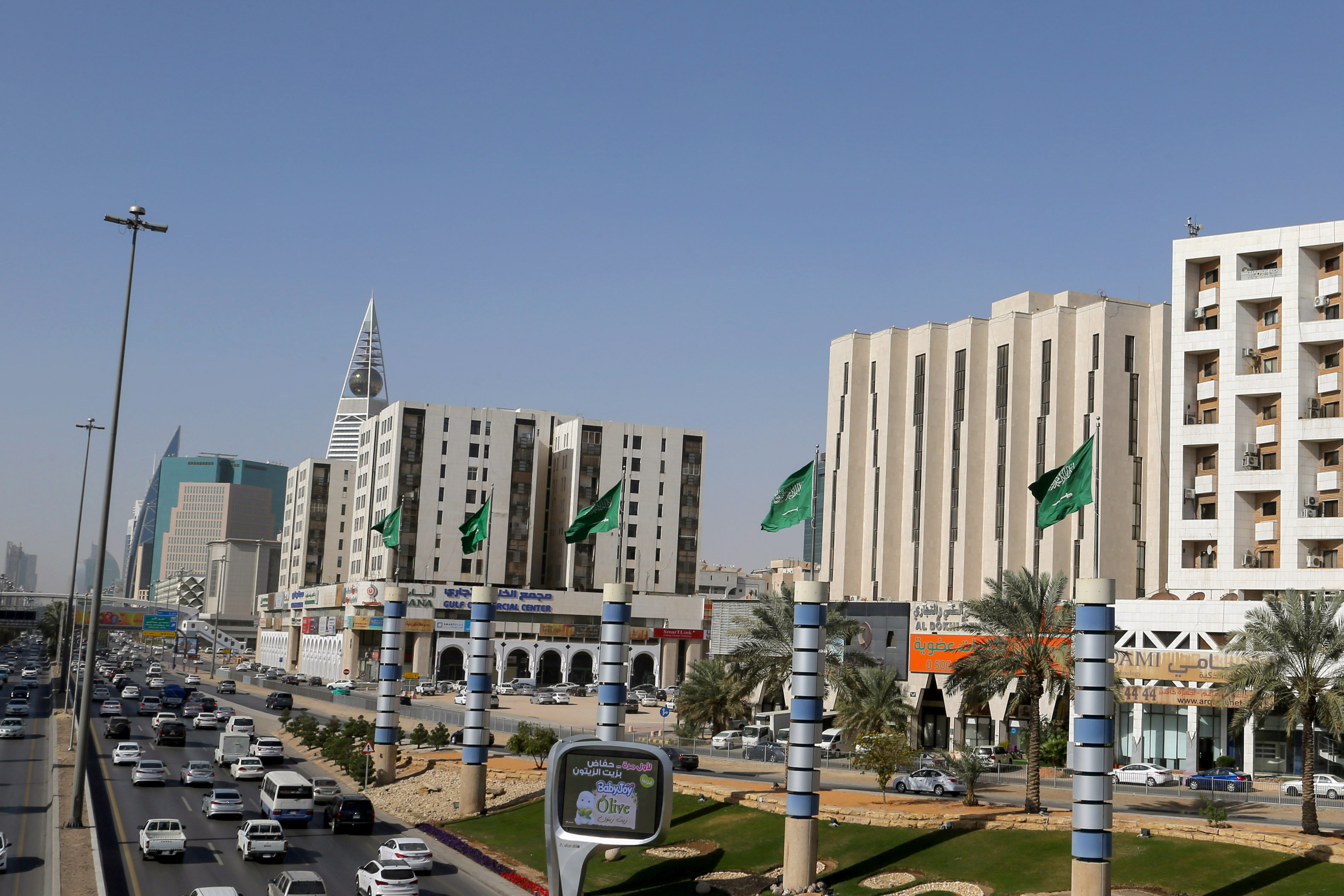
Coming soon: Get the latest news and expert analysis about the state of the global economy with Reuters Econ World. Sign up here.
Reporting by Aziz El Yaakoubi; Editing by Angus MacSwan
Our Standards: The Thomson Reuters Trust Principles. New Tab , opens new tab
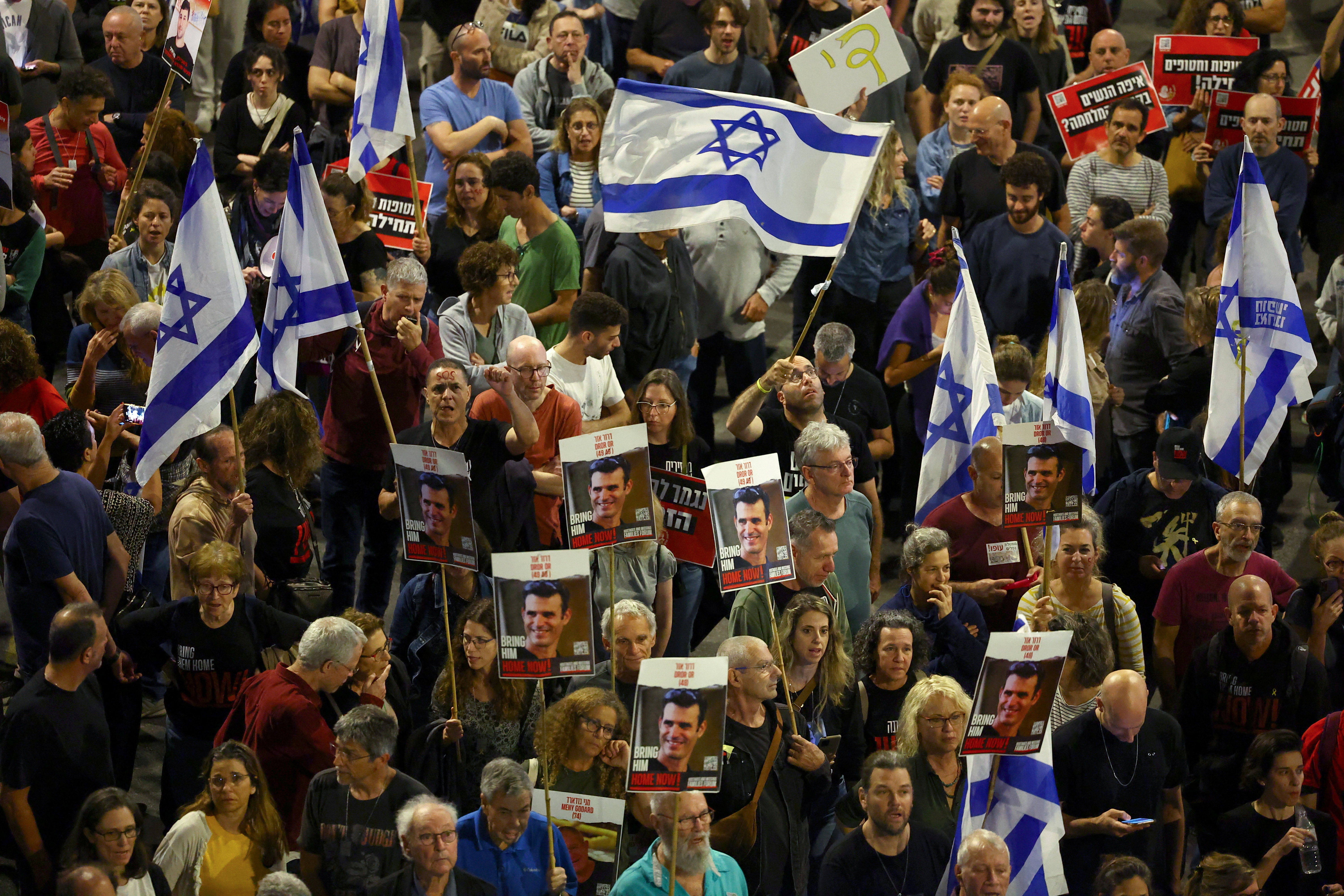
World Chevron
At least two people are dead and six others injured in a shooting at a block party in Memphis, Tennessee, on Saturday, according to police.

South Korea on Sunday protested Japanese Prime Minister Fumio Kishida's offering to Tokyo's Yasukuni Shrine with "deep disappointment" and urged Japanese leaders to show repentance for the country's wartime past.
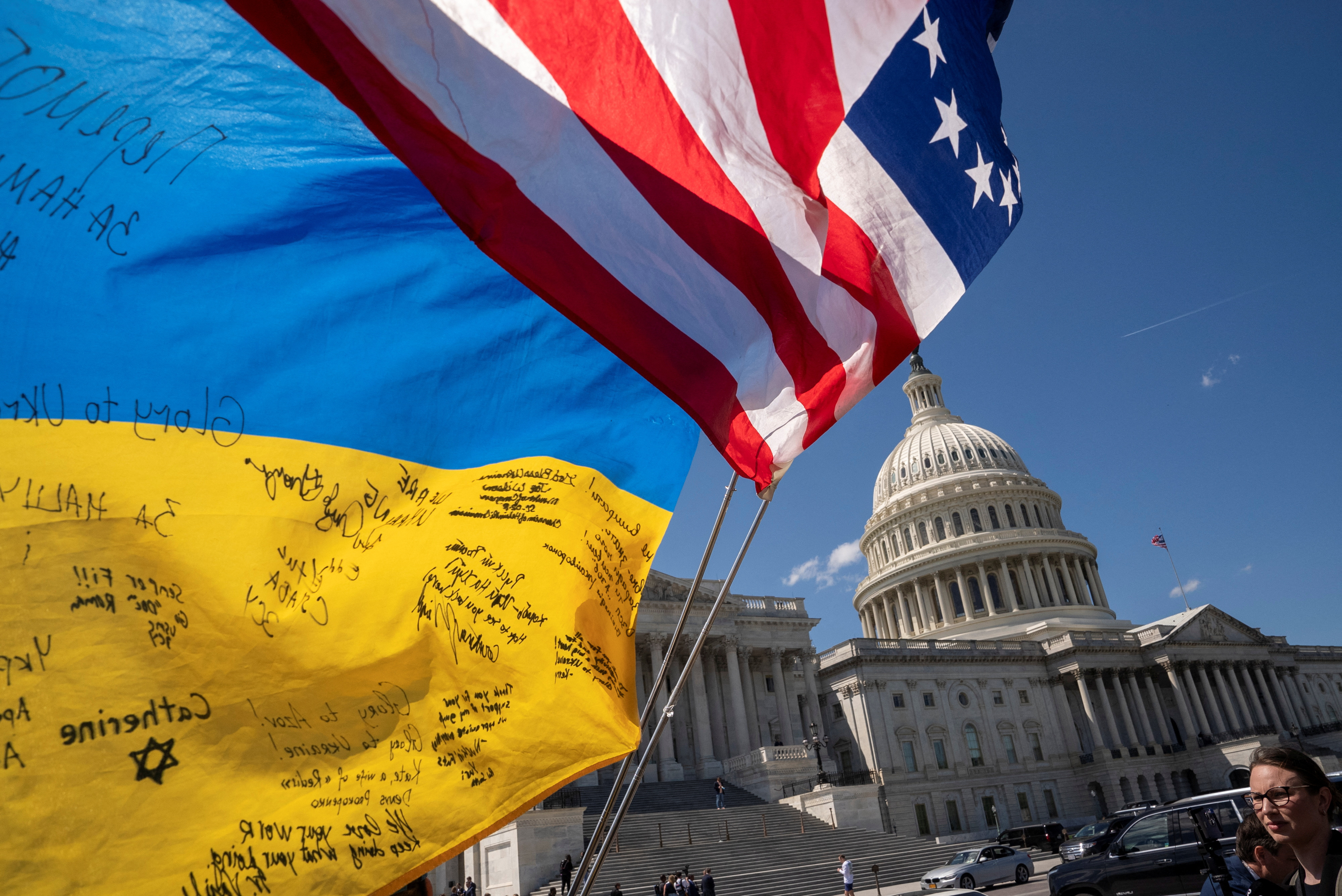
Two Japanese navy helicopters crashed into the sea during a training exercise, killing at least one of the eight crew members on board, the defence minister said on Sunday.
Headscarves, PDA, and alcohol: What to know about visiting Saudi Arabia
By lilit marcus, cnn.
Editor’s Note: This CNN Travel series is, or was, sponsored by the country it highlights. CNN retains full editorial control over subject matter, reporting and frequency of the articles and videos within the sponsorship, in compliance with our policy .
Saudi Arabia has set an ambitious goal for itself: 150 million tourist visits by 2030. Travel e-visas, a growing number of international air links and a new 96-hour layover program have all made it logistically easier to visit.
However, for many first-time visitors, especially ones who aren’t familiar with the Middle East or Muslim-majority countries, it’s critical to do some research before setting off.
The first and most basic thing to know about Saudi Arabia is that it’s not closed off from the world. Although the country has only been offering tourist visas since 2019, things have moved pretty quickly since then.
Just like major cities in Europe or North America, Jeddah and Riyadh have hipster cafes, cool arts and culture venues, and major sports teams packed with international players.
Road signs, menus, maps and more are usually in both Arabic and English. Western credit cards are widely accepted, too.
How do I get there?
Saudi Arabia’s primary air hubs are its two biggest cities – capital Riyadh and port city Jeddah. Regular connections are available via Doha, Dubai, London, and other major gateways.
Once you’re traveling within the country, there are several options. Internal flights are easiest for popular tourist destinations like the oasis town of AlUla, which is where travelers go to access the archeological site of Hegra.
Saudi Arabia has also invested heavily in infrastructure, which includes high-speed rail . Right now, the system only serves Jeddah and the surrounding areas, namely the Muslim holy cities of Mecca and Medina, but there are plans to expand.
Foreign visitors can rent cars in Saudi Arabia, and both men and women can drive – provided their international driver’s licenses and other paperwork are in order.
Uber is available in larger cities, as are Middle East rideshare apps like Careem and Kaiian, both of which have English options. For street hails, there are taxi stands at busy areas like shopping malls and sports stadiums. Your hotel can also organize taxis for you.
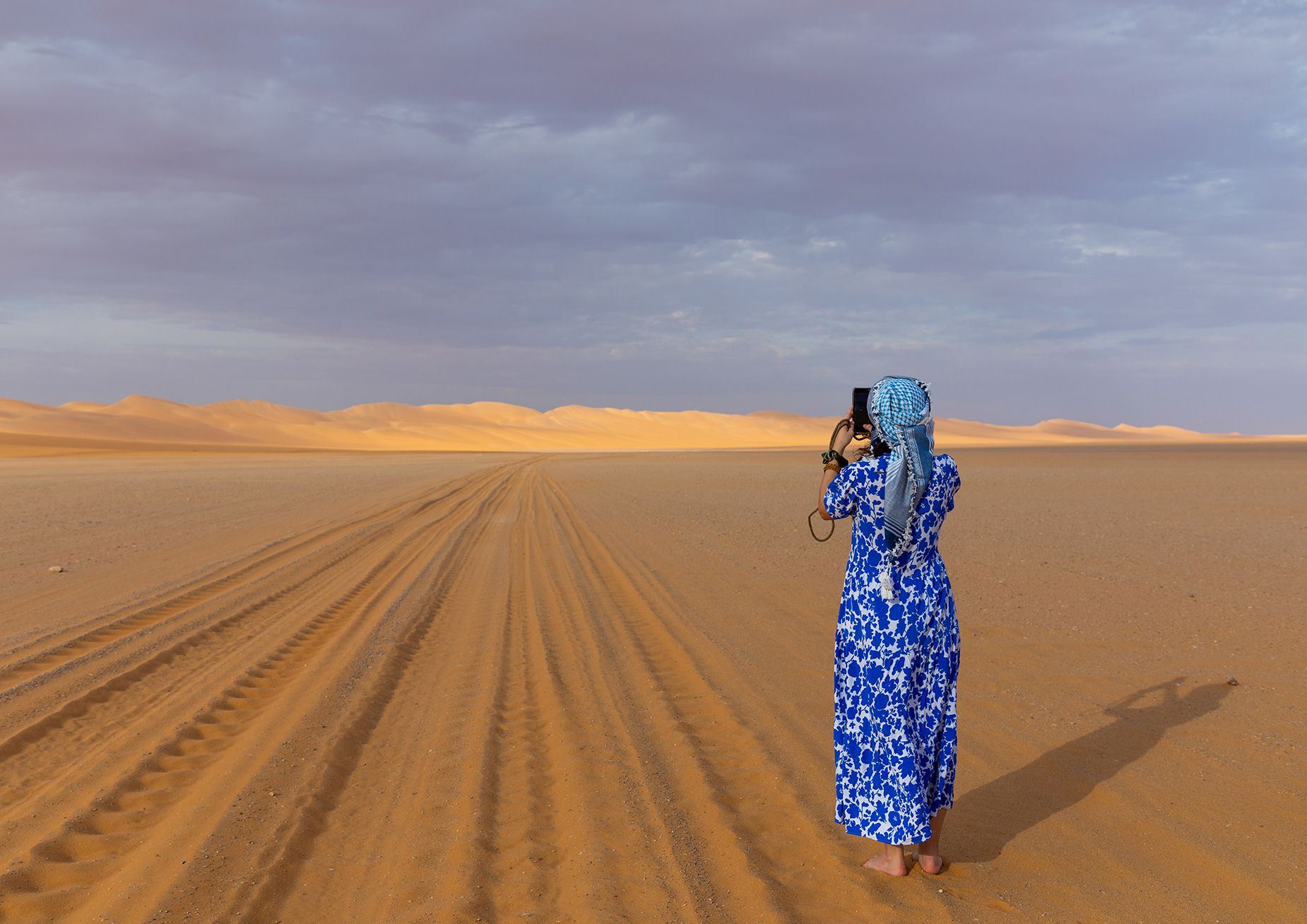
Eric Lafforgue/Art in All of Us/Corbis/Getty Images
What should I pack?
Bulgaria-born Elena Nikolova, who converted to Islam and now resides in Jeddah, makes a perfect bridge between locals and outsiders. On her website Muslim Travel Girl , she helps her followers know what to expect when they visit.
Nikolova also adds that while many women wear abayas, loose garments covering the body, or niqabs, which also cover the face, they’re not required for foreigners. “In big cities like Jeddah and Riyadh you don’t need to wear a scarf or abaya. Wearing clothes that cover your body is OK.”
However, she points out that location is important, as smaller villages in more rural areas might not have the same vibe as major cities. “It is better for you to wear a maxi dress for example or an open abaya and scarf [there],” she adds. According to Nikolova, these guidelines are not laws – it’s just about “fitting in.”
Animal sacrifices and astral tombs: The mysteries still emerging from the Saudi deserts
Kareem George, CEO of travel specialist and tour organizer Culture Traveler , also fielded clothing-related questions from his clients ahead of a Saudi Arabia tour.
“I was surprised by the variety of dress I observed,” he says. “Saudi women and men both in traditional dress as well as more contemporary attire. There was an overall modesty to the dress for both sexes, however there was a lot of variety in colors, styles and textures.”
That said, it’s not unusual to see some men wearing shorts (granted, knee-length ones like cargos, not short shorts) and polo shirts, as the rules for male clothing are more relaxed.
“There was not an expectation for a foreigner to wear a thobe,” George adds, referring to the traditional garment many men wear in the Middle East. “My Western dress was accepted and not considered rude in any way.”
This place was inhabited for centuries – but has only recently had tourists
When it comes to dressing, weather and terrain are important considerations. If you’re planning to hike or visit the desert attractions in AlUla , for example, you’ll want to take tips from the locals: loose-fitting clothing, lightweight fabrics like linen and natural cotton, and hiking boots. It’s not unusual to see a Saudi woman sporting sneakers with her abaya.
And while it’s okay for non-Muslims to visit mosques – a pretty common occurrence, as many are tourist attractions in their own right – proper dress is a must. Women should cover their hair to be respectful.
If you plan to visit mosques, pack some socks – you’ll be asked to remove your shoes to go inside.
Public displays of affection
Tourism is growing in Saudi Arabia and with it more cultural freedoms, but it’s important to remember that certain public displays of affection should be avoided.
No matter the gender or status of the people in a relationship, locking lips in public could result in some surprised stares.
“There is a general expectation of modesty in one’s deportment and respect of others’ personal space in public,” George says.
Nikolova adds: “You can hold hands, but kissing – especially for a prolonged time – is normally frowned upon, mostly because it makes [locals] uncomfortable. “PDA is reserved for couples in private in many Muslim countries.”
Some regulations around unmarried couples have loosened in recent years.
In 2019, Saudi authorities announced that unmarried foreign couples would be permitted to share hotel rooms.
Why Saudi Arabia’s Red Sea coast could be the next big luxury tourism destination
The country’s national travel authority website indicates that LGBTQ tourists are welcome in Saudi Arabia. It says: “Everyone is welcome to visit Saudi, and we ask that they follow and respect our culture and traditions and laws, as you would when visiting any other country in the world.”
That said, it is important to note that gay sex is prohibited by law, with consequences including fines, jail time or even death. The UK Foreign Office , among others, warns its citizens that “homosexual or extra-marital sexual relations, including adultery, are illegal and can be subject to severe penalties.”
There are other social rules to be mindful of. Generally, unrelated men and women wouldn’t be in a private space together. However, this is one of those areas where you’ll need to look around you and do as the locals are doing.
It might be OK for a foreign woman and a local man to have a business meeting together if they’re somewhere public like a coffee shop or if they just keep the office door open. When it comes to greetings, a polite hello is plenty – not everyone will feel comfortable shaking hands or kissing on the cheek, especially with someone of the opposite gender.
In urban areas like Jeddah, single women often take taxis driven by men – but they are expected to always sit in the back.
“It is actually safe for women to travel in Saudi Arabia,” Nikolova says. “You will find that many women go out alone or with friends without issue, especially in large cities like Jeddah and Riyadh.”
Raising a glass
One of the most discussed topics for foreign tourists in Saudi Arabia is alcohol.
While other nearby majority-Muslim countries like Qatar and the United Arab Emirates do sell alcohol under very specific, limited conditions and have it available in hotels, that’s not the case in Saudi. Alcohol isn’t just unfashionable – it’s illegal, regardless of whether you’re a local or a tourist.
And that ban on alcohol isn’t only in practice once you’re on the ground in Saudi Arabia.
That law applies to Saudia, the country’s national airline, as well. If you’re accustomed to having a glass of wine to help you sleep on a long flight, you might want to consider buying a ticket on a carrier that does serve booze on board.
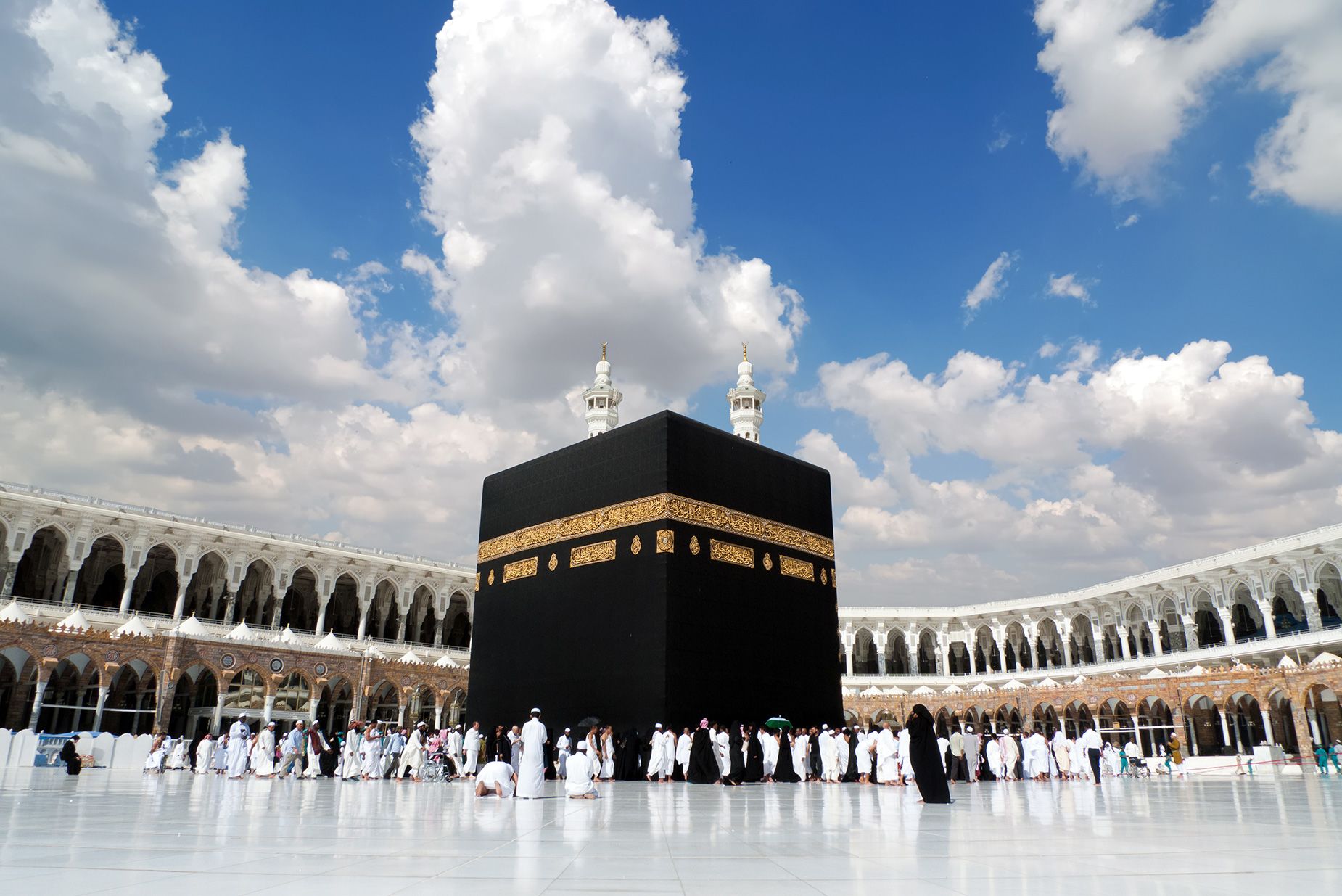
Aviator70/iStockphoto/Getty Images
All in the timing
Mecca, Islam’s holiest city, is here in Saudi Arabia. Muslims are required to make the hajj, or religious pilgrimage to the city’s holiest sites, at least once in their lifetime.
Although it may sound like a bad time to visit Saudi Arabia, Nikolova says that if you’re not Muslim and want to see other parts of the country, hajj could actually be the best time to plan a trip.
While restrictions on tourists are put in place at Jeddah, the rest of Saudi Arabia remains open for tourists, says Nikolova. “Usually that time is also less crowded, as many locals and expats have two weeks off and leave the country for holidays.”
When it comes to visiting mosques, it’s best not to try to go on a Friday, which is the holiest day of the week, or during prayer times. Many mosques will post visitors’ hours outside, and the larger, more famous ones often have a website with more details.
However, there are some mosques you won’t be able to visit – namely those in Mecca and Medina. Those are restricted to Muslims only.
It might also be wise for non-Muslims to avoid visiting during Ramadan, which is the ninth month of the Islamic calendar. (In 2024, it’s likely to run from March 10 to April 8 – lunar months like Ramadan can vary a day either side)
“I would recommend avoiding Muslim countries during Ramadan because there is not much to do during the day,” Nikolova says, noting that because participants fast during the day and eat at night, shops and restaurants open later or not at all.
Many locals also advise against visiting in summer, as it’s normal for temperatures to top 120 degrees Fahrenheit (about 50 Celsius).
Due to the extreme heat, some businesses will close in the afternoon and reopen again later in the day. For example, in Jeddah’s historic al-Balad neighborhood , most cafes and stores shut for several hours at midday.
If you want to find a place that’s open for lunch, head to a mall – and also bring a sweater, as air-conditioning can sometimes overcompensate for the weather by being very strong.
The Red Sea’s luxurious waterfront resorts are best experienced in shoulder season, when prices are lower as well.
January is generally the coolest month of the year, with temperatures around 64-68 Fahrenheit (18-20 degrees Celsius). Winter is the ideal season for enjoying Saudi Arabia’s many outdoor activities, from hiking historic archeological sites to stargazing in the desert.
CNN’s Julia Buckley contributed reporting.
Related Articles

EUROCONTROL praises Egypt’s management to air traffic during exceptional circumstances
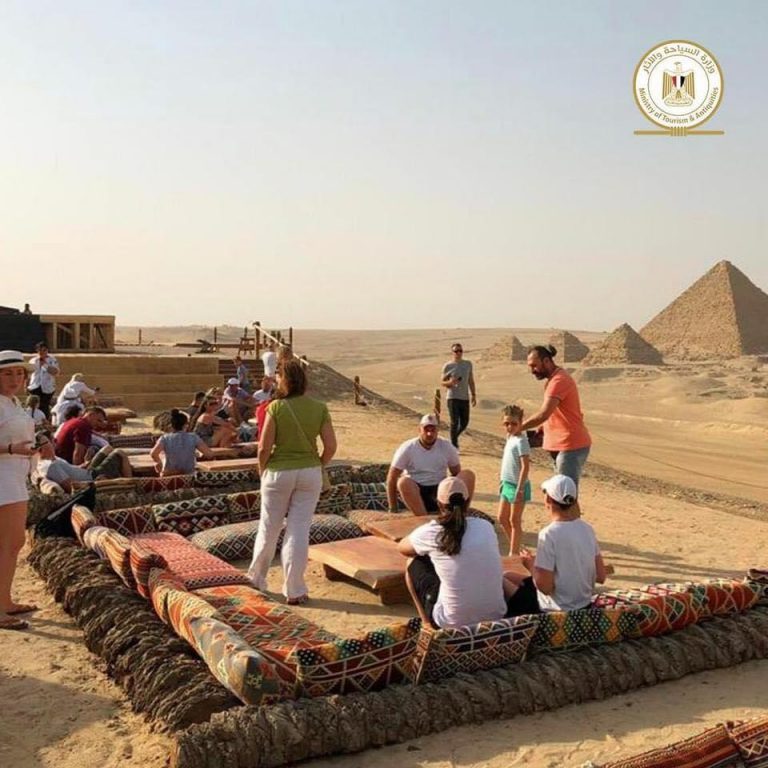
Egypt places new ticket devices to prevent crowding in front of Giza Pyramids area

Saudi Arabia to participate in Miss Universe 2024 for first time
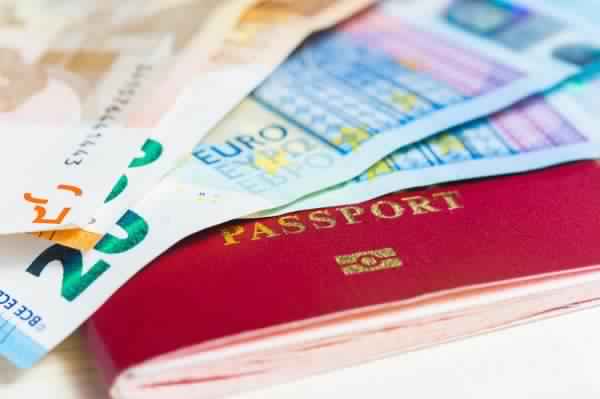
Up to 21% of world population does not need a visa: UN
Please wait while your request is being verified...

IMAGES
VIDEO
COMMENTS
Justin Setterfield/Getty Images. Abu Dhabi CNN —. New rules on alcohol in Saudi Arabia have been revealed ahead of the reported opening of the first-ever liquor store in the capital Riyadh. The ...
The independent index benchmarked 117 countries on 17 pillars fundamental to the development and resilience of their travel and tourism industries. In 2019, Saudi Arabia launched the National ...
On September 27, Saudi Arabia launched a brand-new tourist visa that lets tourists explore the country for 90 days. ... Alcohol of any kind is banned in Saudi Arabia. Those who break the law are ...
Cairo: Saudi Arabia does not plan to lift a ban on serving alcohol as it is opening up to the world and seeking to promote its tourism industry, according to a Saudi official. Saudi Assistant ...
Alcohol is completely banned in Saudi Arabia. This includes consuming, importing, brewing and selling alcohol. Officially, there is no way that you are able to get hold of alcohol in Saudi Arabia. It has been reported before that people have even been arrested for just smelling like alcohol. Locals and expats often travel to Saudi's ...
Saudi Arabia has no plans to legalise alcohol — either at futuristic megacity Neom or in a bid to draw more visitors, assistant minister of tourism Princess Haifa bint Mohammed said on Wednesday.. Speaking at the World Economic Forum in Davos, Switzerland, Princess Haifa said the kingdom has been "doing well" in attracting visitors since launching tourism e-visas in 2019 and that rules ...
Saudi Arabia has set an ambitious goal for itself: 150 million tourist visits by 2030. Travel e-visas, a growing number of international air links and a new 96-hour layover program have all made ...
Illustrative photo of alcohol bottles (Abir Sultan/Flash90) Saudi Arabia is planning to break with its total ban on alcohol by offering strong drinks at a new resort scheduled to open next year ...
Saudi Arabia will allow the public sale of alcohol for the first time in decades at a new shop in the capital Riyadh catering exclusively to non-Muslim diplomats. The move follows years of ...
Saudi Arabia is a place steeped in history and culture, but it also has its own social norms and laws. In this article, we'll inform you about 10 things you can't do as a tourist in Saudi Arabia. From alcohol consumption to dress code restrictions, we assure you that this knowledge will help you enjoy your trip respectfully and hassle-free.
Assistant Minister of Tourism Princess Haifa Bint Mohammed ruled out the option to change laws in Saudi Arabia to introduce alcohol in the Kingdom. The official was asked, in a panel session about Saudi Arabia at the World Economic Forum, about the possibility of offering alcohol in new destinations such as NEOM. "The short answer is that we ...
Posted in Politics & Economics, Latest News, Saudi Arabia, Travel & Hospitality Saudi doesn't need to change alcohol laws for its tourism sector to thrive: Princess Haifa Al-Saud . Saudi Arabia has been outperforming globally when it comes to tourism with what we already have to offer; there's a lot to go around without introducing alcohol, the kingdom's Assistant Minister of Tourism said
Saudi Arabia has opened an off-licence in the diplomatic quarter of its capital, Riyadh, which is the kingdom's first commercial outlet for the sale of alcohol beverages since a ban on the public sale and consumption of alcohol was imposed in 1952. We expect further relaxation of alcohol laws, together with the implementation of other social ...
Saudi Arabia is planning to open its first liquor store for non-Muslim diplomats in the coming weeks, in the latest shift in the kingdom's conservative societal traditions and more broadly in the Gulf states' culture, where many countries are seeing the opening of alcohol shops and breweries.. Reuters, citing an undisclosed document and a source familiar with the plans, reported on Wednesday ...
Under his Vision 2030 reform agenda, Saudi Arabia's de facto ruler, crown prince Mohammed bin Salman, is trying to turn the world's biggest crude exporter into a business, sports and tourism ...
Call us in Washington, D.C. at 1-888-407-4747 (toll-free in the United States and Canada) or 1-202-501-4444 (from all other countries) from 8:00 a.m. to 8:00 p.m., Eastern Standard Time, Monday through Friday (except U.S. federal holidays). See the State Department's travel website for the Worldwide Caution and Travel Advisories.
The move is a milestone in the kingdom's efforts, led by Saudi Crown Prince Mohammed bin Salman, to open the ultra-conservative Muslim country for tourism and business as drinking alcohol is ...
Saudi Arabia has set an ambitious goal for itself: 150 million tourist visits by 2030. Travel e-visas, a growing number of international air links and a new 96-hour layover program have all made it logistically easier to visit.. However, for many first-time visitors, especially ones who aren't familiar with the Middle East or Muslim-majority countries, it's critical to do some research ...
Yes, tourists are allowed to drink alcohol in Saudi Arabia, but there are certain restrictions and regulations that they must adhere to. Saudi Arabia follows strict Islamic laws that prohibit the consumption of alcohol for its Muslim citizens. However, the government has recognized the importance of tourism and has made some exceptions for non ...
Saudi Arabia may sell alcohol in duty free. Arabian Business reports that Saudi Arabia is considering introducing the sale of alcohol in duty free areas at select airports. While no final decision has been made, a consultation process is currently underway with stakeholders. According to the plan, alcohol would initially only be available for ...
No, alcohol is not allowed. Your friend may take you to Bahrain for a drink, or you can replace the alcohol with some fine authentic Saudi coffee, tea, or Barbican which is also good as a non-alcoholic beverage. 142K subscribers in the saudiarabia community. A community based on the Kingdom of Saudi Arabia, from the open blue seas to the wide ...